DashClicks Blog
The industry's top experts offer their best advice, research, how-tos, and insights—all in the name of helping you level-up your business and online marketing skills.
Join Us!

The Best Subscription Billing Software for Growing Your SaaS Business in 2026
Subscription billing has evolved from a simple invoicing task into one of the core engines of SaaS growth. The subscription economy is expanding rapidly, and with it comes higher expectations around billing accuracy, automation, pricing experimentation, and revenue reporting. For SaaS teams moving into 2026, the right subscription billing software is central to scaling efficiently, improving forecasting, and supporting increasingly global customer bases.
This guide breaks down the top billing platforms for SaaS companies at different stages - from startup to enterprise. You’ll find an overview of each tool’s strengths, real-world use cases, and the criteria that matter most when choosing a system. The Billing Software by DashClicks is well-suited for SaaS and service-led businesses that prioritize streamlined recurring billing, client-centric financial operations, and operational simplicity as they scale.
How to Chose the Best Billing Softare?
Reviewed each platform based on:
- Billing flexibility and pricing model support.
- Integration depth across CRM, ERP, and payments.
- Revenue recognition and compliance capabilities.
- Scalability for multi-entity and global operations.
- Usability and implementation practicalities.
- Financial reporting and analytics strength.
The Best Subscription Billing Platforms for 2026
1. DashClicks' Billing Software
DashClicks’ Billing Software is purpose-built for digital agencies, SaaS providers, and service-based businesses that manage recurring client billing, retainers, and bundled service plans. Unlike traditional SaaS billing tools that focus primarily on product subscriptions, DashClicks is designed around client-centric billing workflows common in agency and SaaS hybrid models.
The platform allows teams to automate recurring invoices, manage subscription plans, handle one-time charges, and centralize client billing inside a unified operations dashboard. For growing SaaS companies that also offer managed services, white-label solutions, or performance-based retainers, DashClicks bridges the gap between billing, client management, and revenue tracking.
DashClicks stands out for its simplicity, speed of setup, and operational alignment—making it especially attractive for teams that want predictable recurring revenue without enterprise-level complexity.
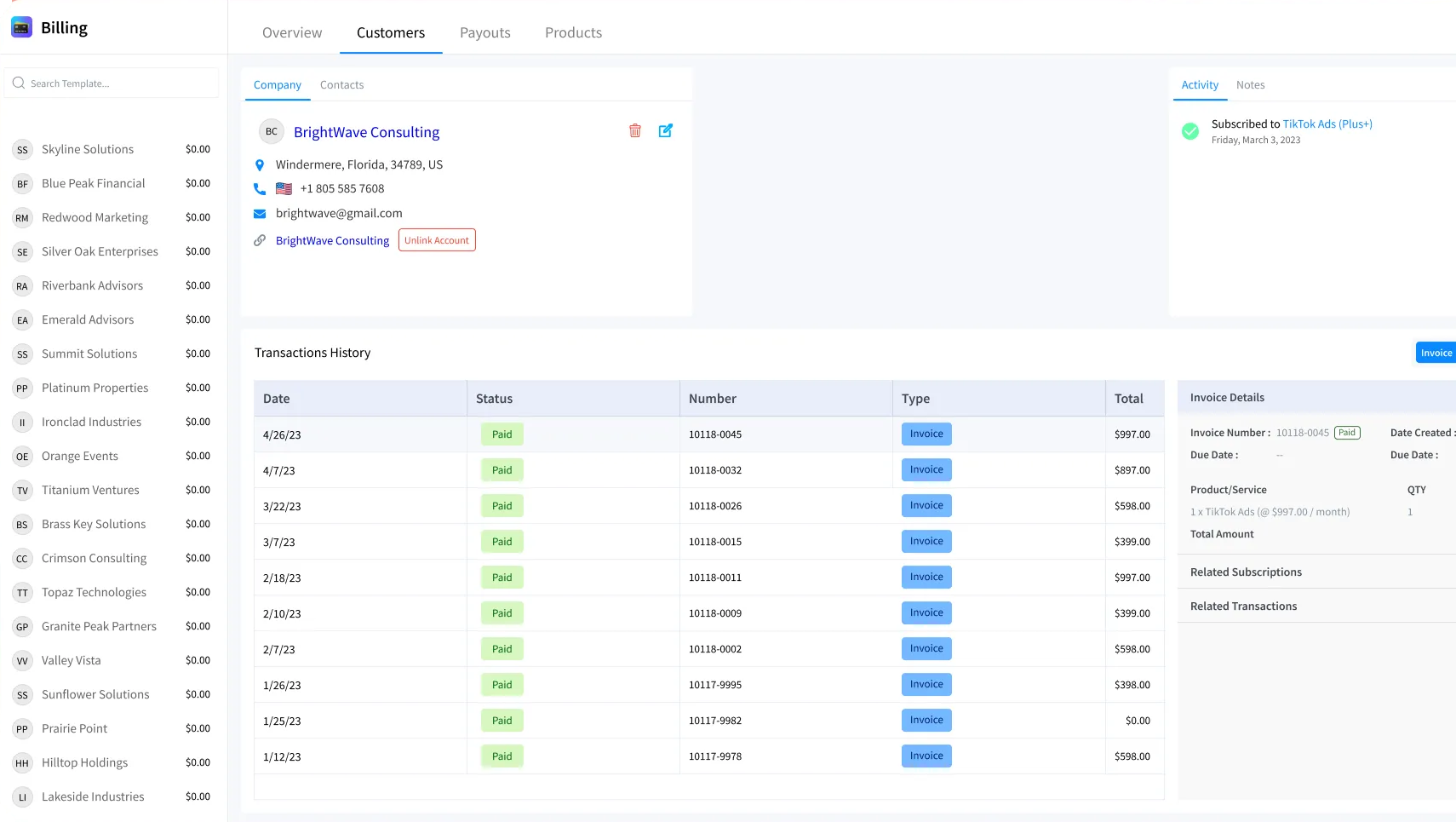
Key Strengths:
- Automated recurring billing and subscription management.
- Client-centric invoicing for retainers and service bundles.
- Unified dashboard for billing, clients, and revenue visibility.
- Fast setup with minimal technical overhead.
- Well-suited for agencies and SaaS businesses offering managed services.
Limitations:
- Not designed for highly complex enterprise revenue recognition requirements.
- Limited suitability for usage-heavy or consumption-based billing models.
2. Younium
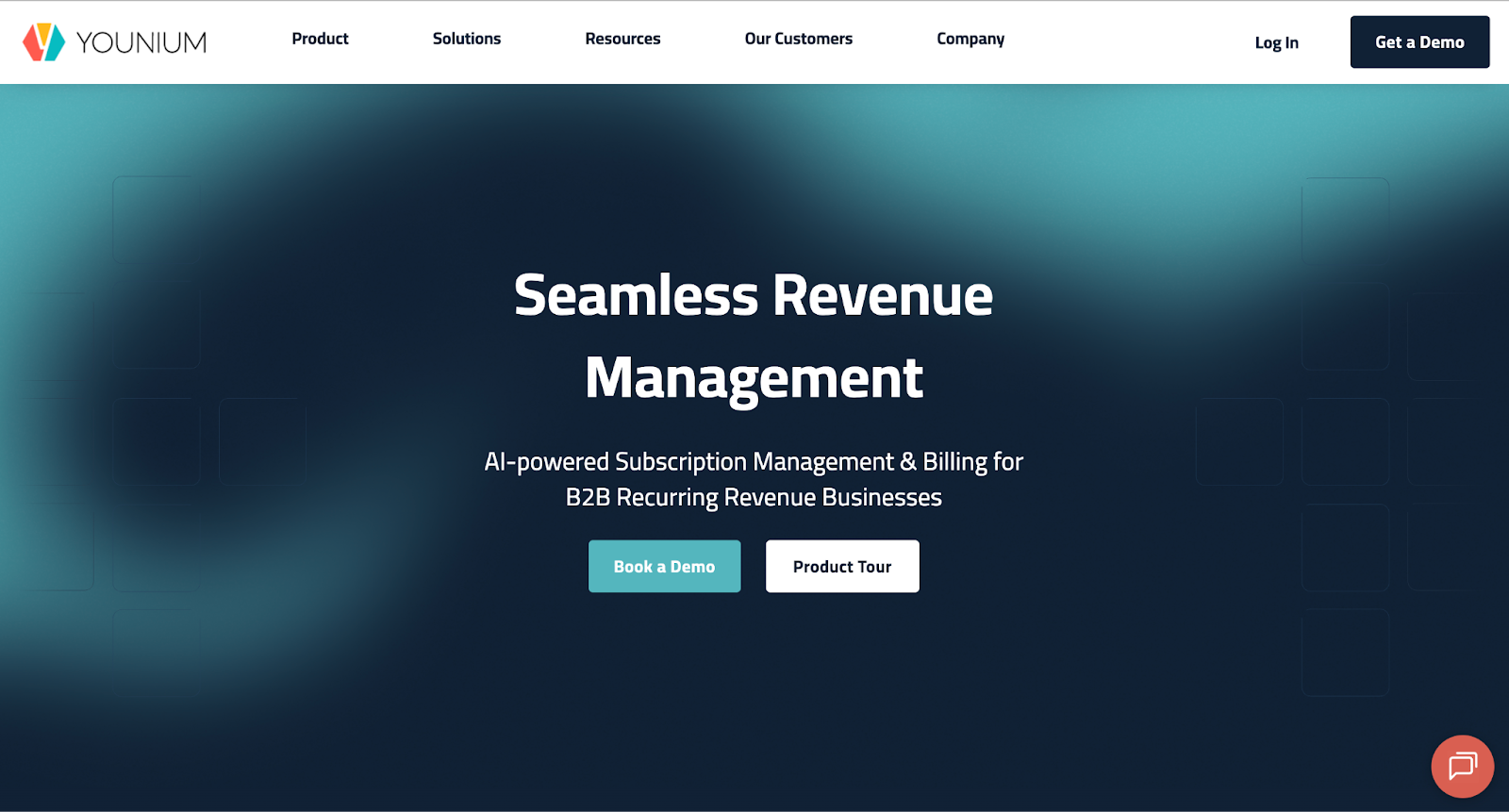
Younium is built for scaling B2B SaaS companies that need strong control over contract details, recurring billing logic, and revenue workflows. It excels in handling multi-year agreements, amendments, usage charges, proration, co-terming, and complex pricing structures.
Its standout capability is depth: flexible contract modeling, multi-entity support, automated revenue recognition, and clean synchronization across CRM and ERP systems. Finance teams use Younium as a centralized subscription source of truth, ensuring accurate invoicing, forecasting, and audit-ready financial reporting.
In practice, Younium supports cross-functional collaboration between finance, RevOps, sales, and customer success - especially when contract complexity outgrows lightweight billing tools.
Key Strengths:
- Excellent handling of advanced B2B contracts and amendments.
- Flexible billing models for recurring, usage, and milestone-based pricing.
- Strong multi-entity and multi-currency support.
- Reliable revenue recognition and audit compliance.
Limitations:
- Not ideal for early-stage startups with simple self-serve plans.
- Requires involvement from both finance and operations during setup.
3. Stripe Billing
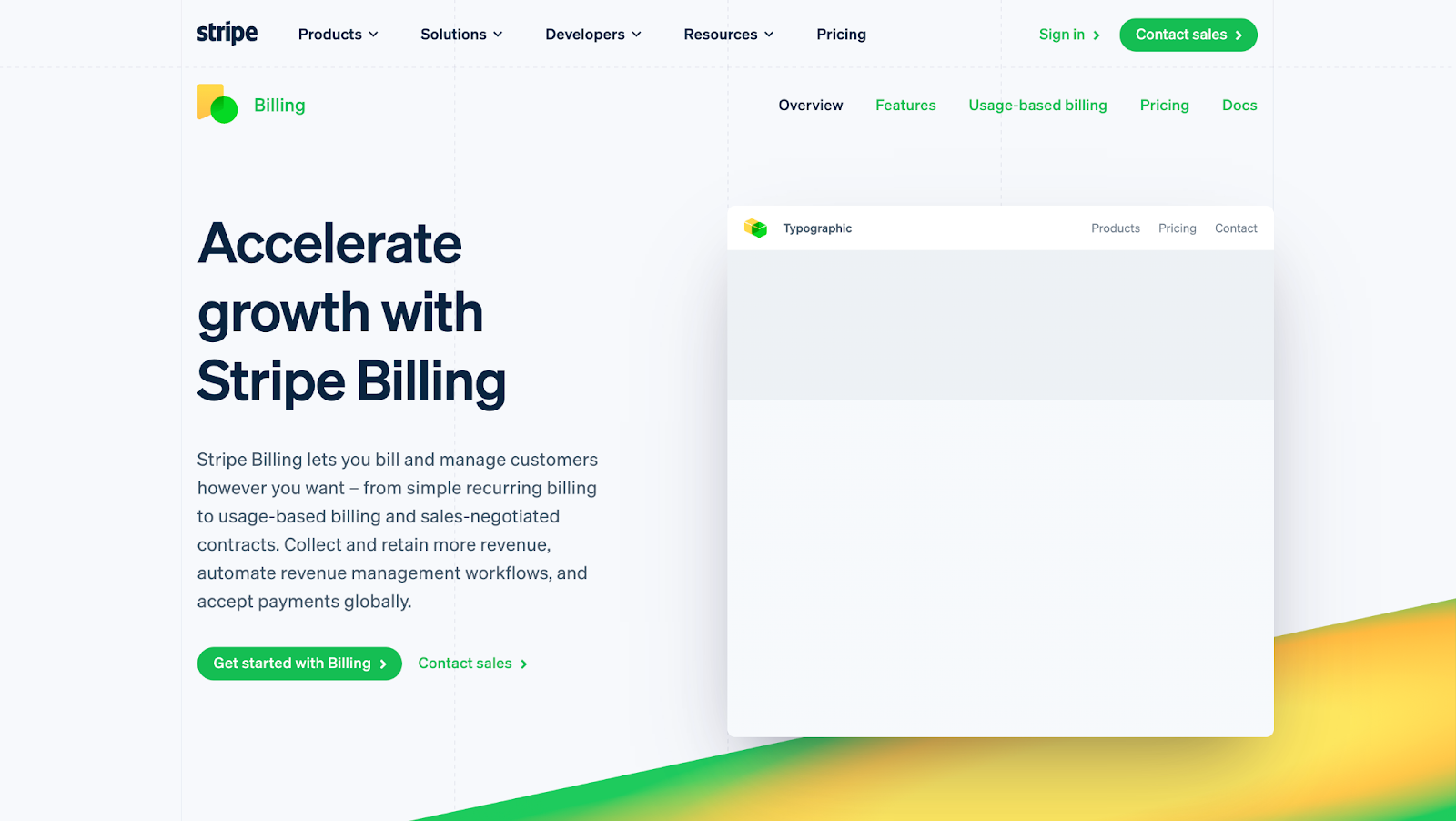
Stripe Billing is ideal for startups and product-led SaaS companies that want fast, developer-friendly billing that integrates seamlessly with Stripe Payments. It supports recurring billing, invoicing, couponing, usage-based pricing, smart retries, and global payment methods.
Its strength lies in simplicity and speed. Teams can implement Stripe Billing quickly, iterate on pricing without heavy configuration, and leverage a broad ecosystem of integrations and developer tools.
Common use cases include self-serve checkout, free trial conversion flows, and basic usage metering tied to Stripe’s event system.
Key Strengths:
- Extremely strong APIs and developer experience.
- Unified payments + billing infrastructure.
- Fast onboarding and rapid pricing experimentation.
- Ideal for global card payments and simple usage billing.
Limitations:
- Less suited for complex B2B contract structures.
- Revenue workflows and financial reporting require additional tooling.
4. Chargebee
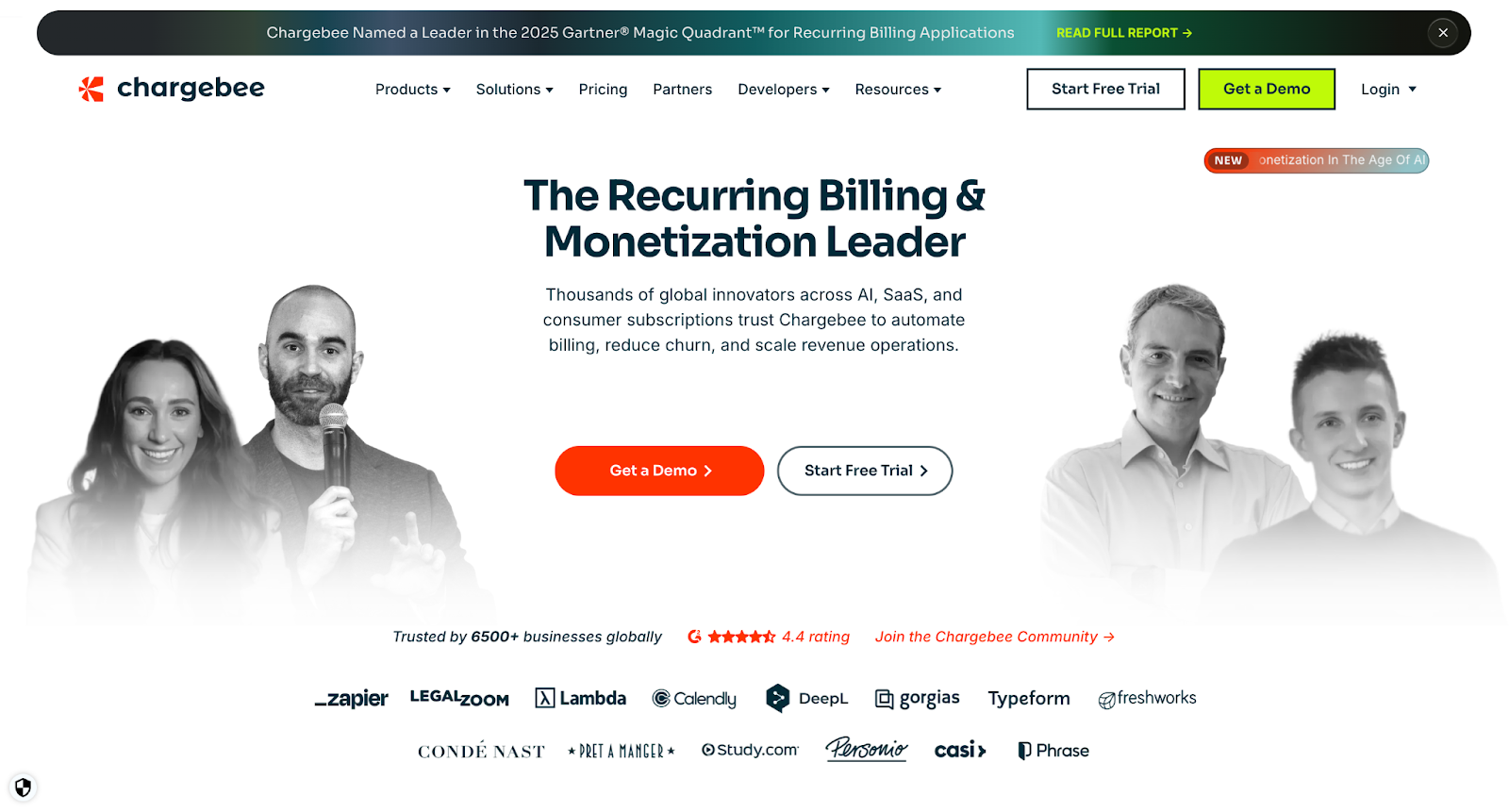
Chargebee is a long-standing subscription billing and lifecycle management platform designed for SaaS growth. It provides invoicing, dunning, tax handling, couponing, customer portals, revenue recognition, and strong analytics.
Its strength is versatility. Chargebee works well for mid-size SaaS teams that need a combination of automation, global billing, and integrations without jumping to a full enterprise suite.
Teams use Chargebee to manage subscription catalogs, automate renewals and upgrades, reduce involuntary churn, and unify subscription data across sales and finance tools.
Key Strengths:
- Broad subscription lifecycle functionality.
- Strong dunning and retention automation.
- Large integration ecosystem.
- Suitable for global SaaS with multiple tax jurisdictions.
Limitations:
- Can feel heavy for very simple subscription products.
- Complexity increases as catalogs grow.
5. Zuora
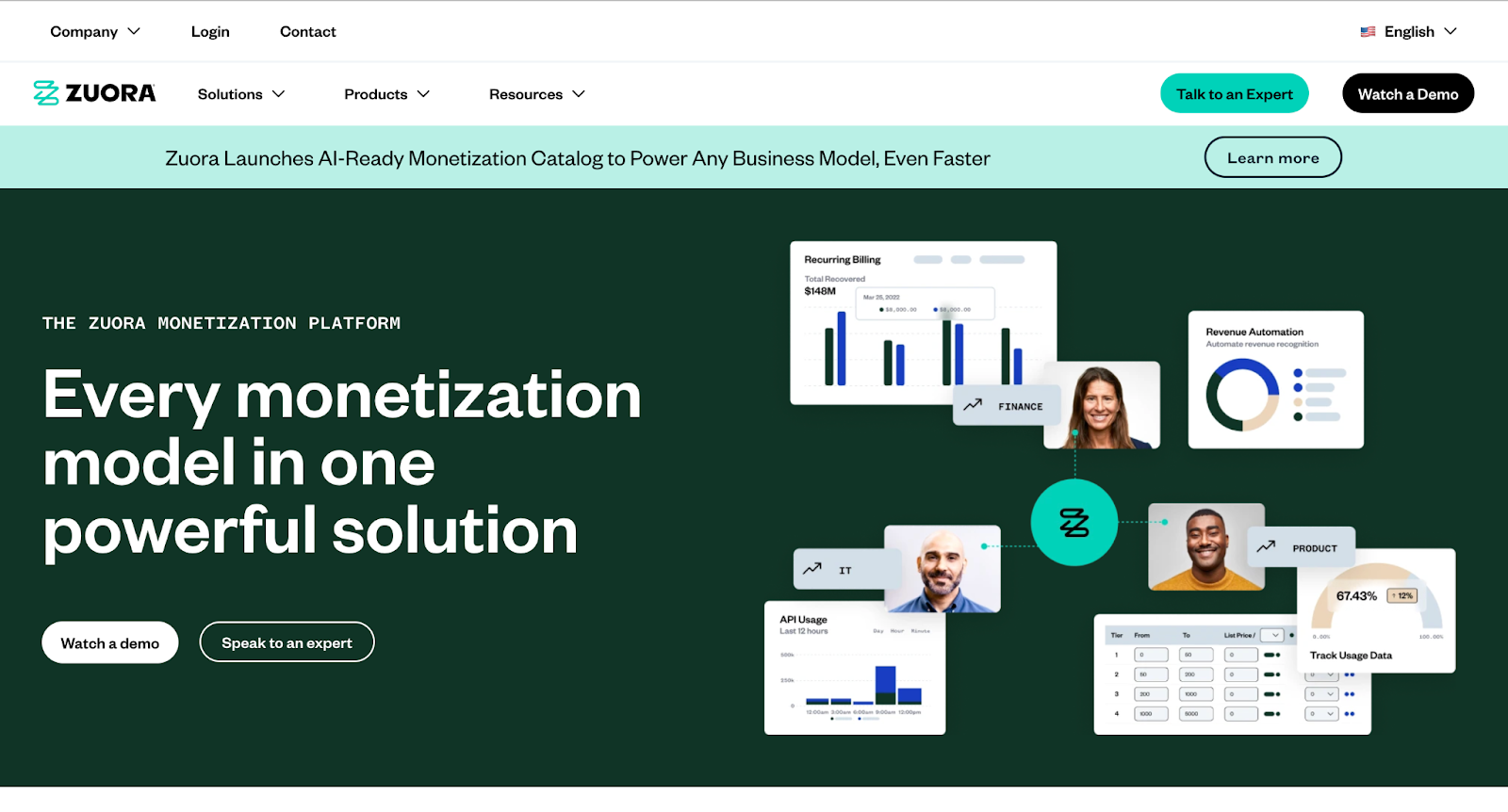
Zuora is a full monetization platform built for enterprises managing highly complex pricing, global operations, and multi-entity financial processes. It includes billing, payments, subscription management, revenue recognition, CPQ, and a unified subledger.
Its power lies in configurability and scale: Zuora supports intricate billing logic, global taxation, multi-currency operations, and governance requirements often seen in enterprise SaaS.
Organizations typically use Zuora to unify quote-to-cash across CRM, CPQ, ERP, and revenue systems, ensuring consistency across departments and geographies.
Key Strengths:
- End-to-end monetization suite.
- Designed for complex global operations.
- Highly configurable billing and catalog structures.
- Enterprise-grade governance and compliance.
Limitations:
- Requires a structured, resource-intensive implementation.
- Best suited for mature teams with dedicated finance and RevOps functions.
6. Maxio
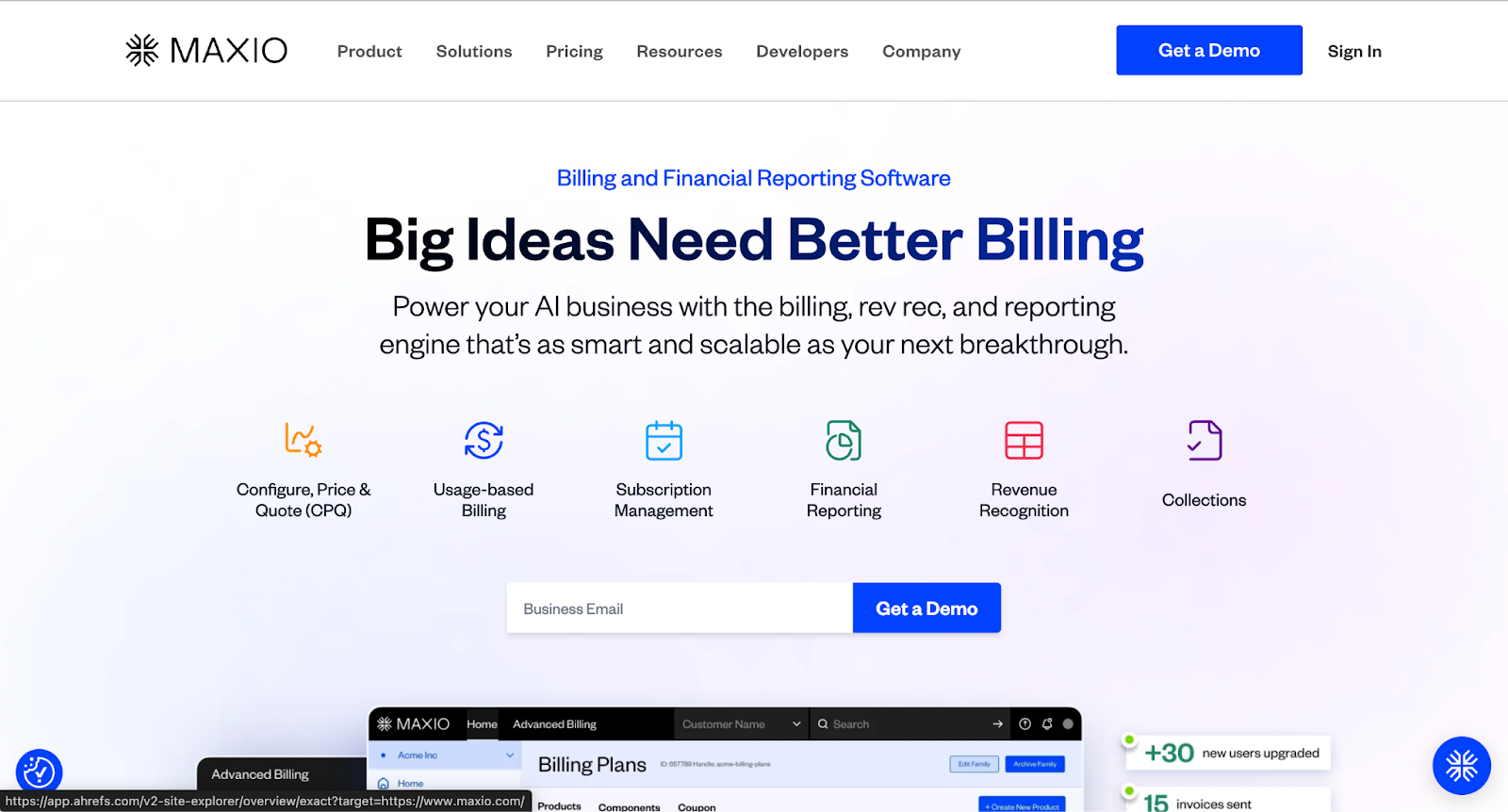
Maxio, formed from the merger of Chargify and SaaSOptics, targets finance-led SaaS teams that want billing, revenue recognition, and SaaS analytics in one system. It’s especially strong for B2B SaaS companies that prioritize clean subscription data and investor-ready metrics.
Maxio includes catalog management, recurring billing, usage billing, automated dunning, audit-compliant revenue recognition, and dashboards for ARR, churn, cohorts, and forecasting.
Finance teams value Maxio for its unified data structure and reporting depth—reducing the need for spreadsheets and manual reconciliation.
Key Strengths:
- All-in-one billing + rev rec + SaaS metrics.
- Ideal for finance and RevOps teams.
- Strong analytics and reporting used for board and investor insights.
- Good fit for mid-market B2B SaaS.
Limitations:
- Less tailored for self-serve or B2C models.
- Works best when processes are already reasonably structured.
7. Paddle
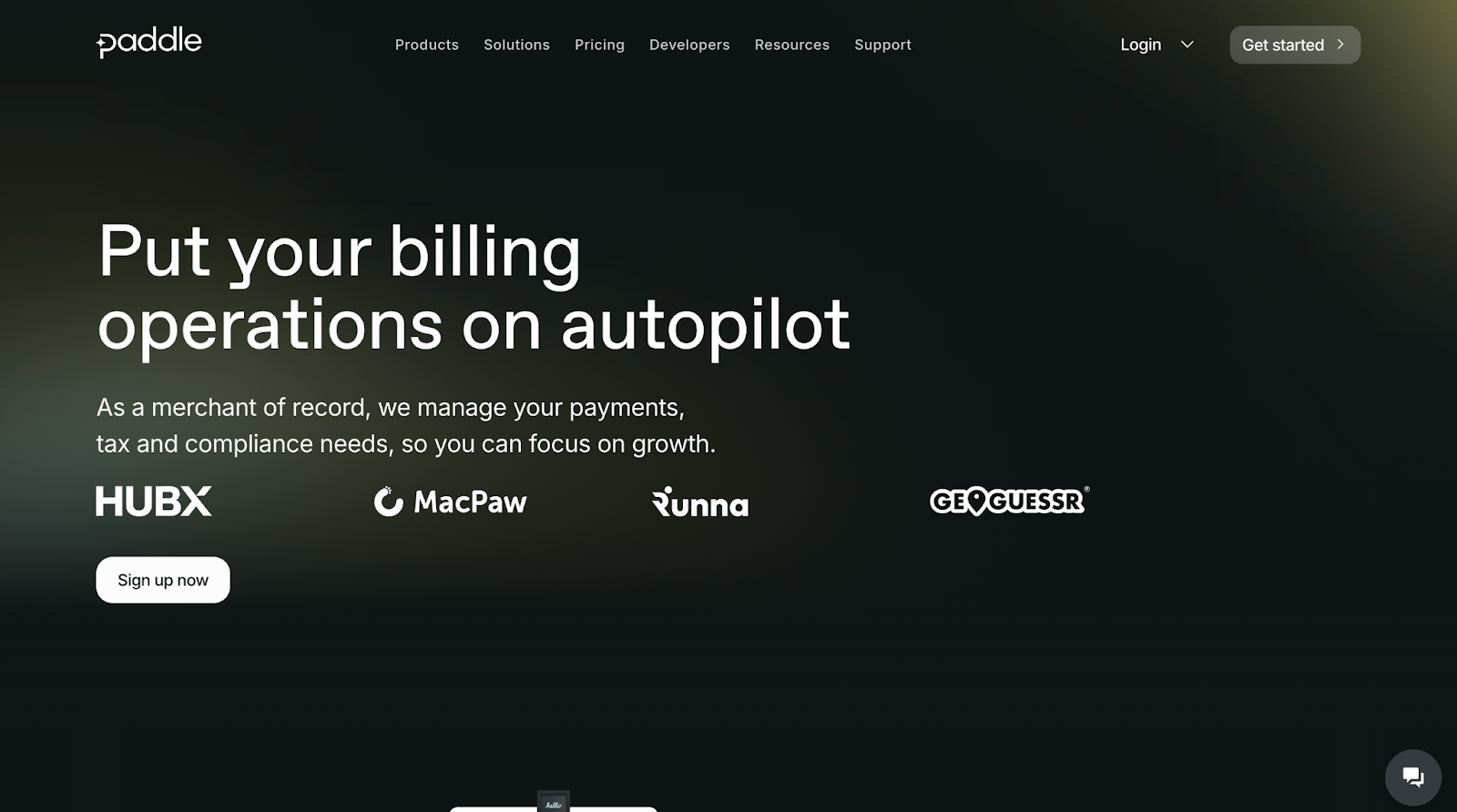
Paddle is a merchant-of-record (MoR) platform built for SaaS companies selling globally. Paddle becomes the legal seller of record for your transactions, handling payments, fraud, taxes, VAT/GST, and compliance on your behalf.
This model significantly reduces operational overhead - especially for lean teams expanding into new regions where tax requirements are complex.
Teams use Paddle to launch globally without building their own tax stack, payments infrastructure, or compliance workflows.
Key Strengths:
- Merchant-of-record model offloads global tax and compliance.
- Unified payments, checkout, billing, and subscriptions.
- Excellent for small teams selling internationally.
- Reduces the overhead of managing local tax obligations.
Limitations:
- Revenue share pricing can be higher than raw payment processing.
- Less customizable than developer-led payment stacks.
Which Option Is Best for You?
- Best for agencies and service-led SaaS: DashClicks’ Billing Software
- Best for scaling B2B SaaS: Younium
- Best for startups and product-led teams: Stripe Billing
- Best for mid–large SaaS: Chargebee
- Best for enterprise complexity: Zuora
- Best for finance-led teams prioritizing revenue accuracy: Maxio
- Best for global expansion with lean ops: Paddle
Additional Contenders
- Recurly – Strong recurring billing with a focus on churn reduction and analytics.
- FastSpring – All-in-one commerce for digital products and software; MoR-style model.
- Ordway – B2B billing automation for complex, multi-step order-to-cash processes.
Further Reading: 7 Reasons Automated Billing Ignites Growth & Improves CX
FAQs
Q1. What is subscription billing software?
Ans. Software that automates recurring billing, payments, renewals, upgrades, downgrades, and often revenue recognition and reporting.
Q2. How can subscription billing software improve a business’s financial operations?
Ans. Subscription billing software automates recurring invoicing, revenue tracking, and payment workflows, reducing manual effort and billing errors. DashClicks’ Billing Software centralizes client subscriptions and recurring billing in one dashboard, helping businesses maintain cleaner financial operations and more predictable cash flow.
Q3. Which platform is best for startups?
Ans. Stripe Billing - simple, fast, and developer-friendly.
Q4. Which platform handles complex contracts best?
Ans. DashClicks, Younium and Zuora are strongest for advanced B2B contract and pricing structures.
Q5. Do these tools support revenue recognition?
Ans. Yes, mid-market and enterprise tools like DashClicks, Younium, Chargebee, Maxio, and Zuora include or integrate tightly with revenue recognition.
Q6. How much does subscription billing software cost?
Ans. Pricing varies widely - from small usage-based fees for startups to custom enterprise pricing. Paddle uses a revenue-share model as a merchant of record.
Conclusion
Subscription billing platforms have become essential infrastructure for SaaS businesses. The best tool depends on your contract complexity, team structure, global footprint, and pricing strategy. DashClicks is a strong choice for agencies and service-led SaaS businesses that need streamlined recurring billing, client-centric invoicing, and operational simplicity. Stripe Billing serves startups well with its fast, API-driven approach. Chargebee and Maxio offer robust mid-market capabilities, while Zuora leads in enterprise monetization. Paddle simplifies global operations through its merchant-of-record model.
By evaluating your revenue operations maturity and future scaling plans, you can select a billing system that not only supports your current needs but accelerates your long-term growth.
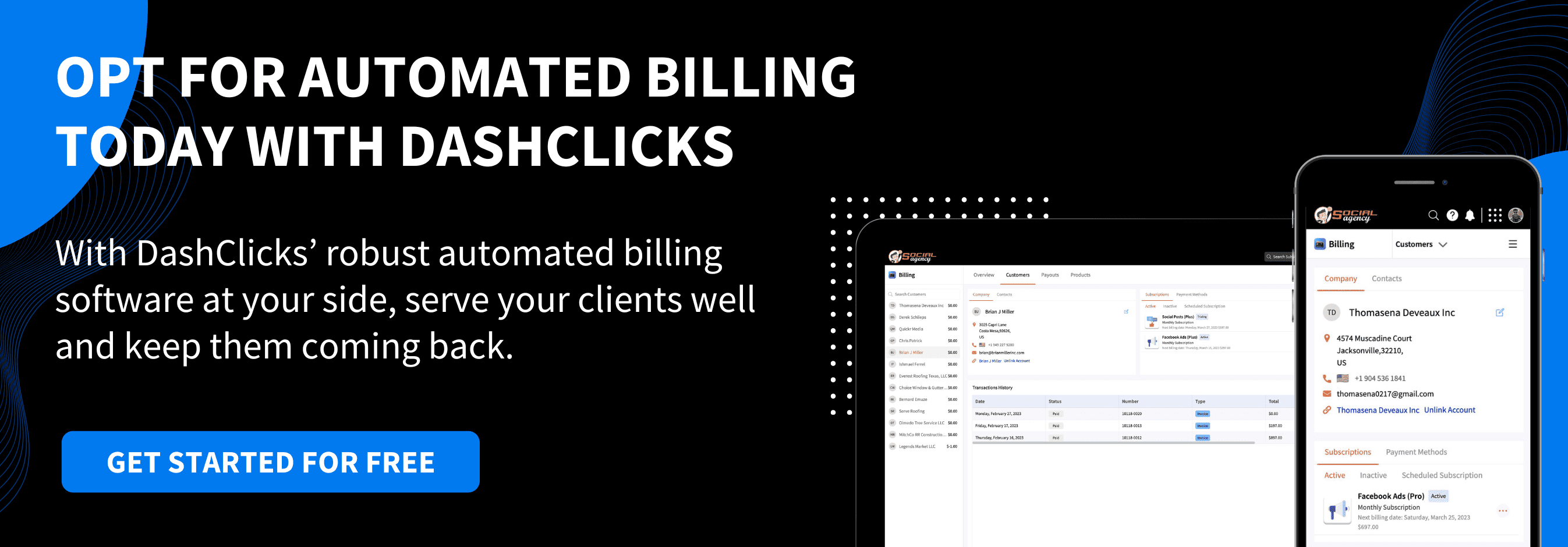

How AI and Automation Are Shaping the Future of Business and Digital Content
The pace of business and digital marketing is accelerating. Agencies and teams face growing pressure to deliver more content, faster results, and better insights, all while keeping clients happy and operations running smoothly. Traditional workflows just cannot keep up.
This article is for agency leaders, marketers, and business professionals who want to understand how AI and automation can transform the way they work. If you are responsible for scaling agency operations, improving efficiency, or staying ahead of the competition, this guide is for you.
Agencies Can’t Afford to Ignore AI Anymore
There’s a growing gap between agencies that use AI daily and those still testing the waters. You can see it in their workflows and the speed at which they deliver results. And in how calm their teams seem during busy seasons.
Agencies that have leaned into AI and automation are finding their rhythm:
- Projects move faster because routine tasks are handled automatically.
- Teams spend less time on admin and more time thinking creatively.
- Clients get clearer insights and quicker turnarounds.
Others are still racing the clock. Spreadsheets grow. Reports take days. Clients wait longer than they should. Not because the team lacks skill, but because there are only so many hours to give.
Investors see what is happening, too. When firms like Meridian AI Private Equity place their focus on automation-first ventures, that is a signal worth paying attention to. The industry is changing. The early adopters are setting new expectations for speed, accuracy, and results.
So it is worth asking: Are your systems keeping up with what is next?
Scaling Your Agency With Automation-First Operations
Every growing agency eventually hits a point where hiring alone is not enough to keep up. Real growth happens when your systems support the people who keep your business running. For tech-based businesses, partnering with a reliable 12 layer PCB manufacturer can be key to ensuring that your production processes run smoothly and your innovation continues without delay.
Automation makes that shift possible. Here’s what that looks like in everyday agency operations:
- New clients are onboarded automatically through the DashClicks' Contact Management Software, with their information routed to the right apps and teams.
- Teams stay up to date with mandatory training through an LMS for compliance training from Kallidus, without adding extra administrative work.
- Proposals and agreements are generated and sent automatically, no formatting required.
- Tasks and fulfillment steps launch immediately when a client signs.
- Lead assignments happen instantly based on predefined rules in DashClicks' Lead Management Software, removing guesswork.
- Campaign assets are collected and organized in the right folders via a Digital Asset Management tool.
- Weekly and monthly reports are generated as performance data updates in DashClicks or Google Data Studio, not days later.
- Alerts notify your team when KPIs shift, so adjustments happen sooner, through automations.
- Client communication templates trigger at the right time in the right channel.
- Approvals flow to the right people without lost emails.
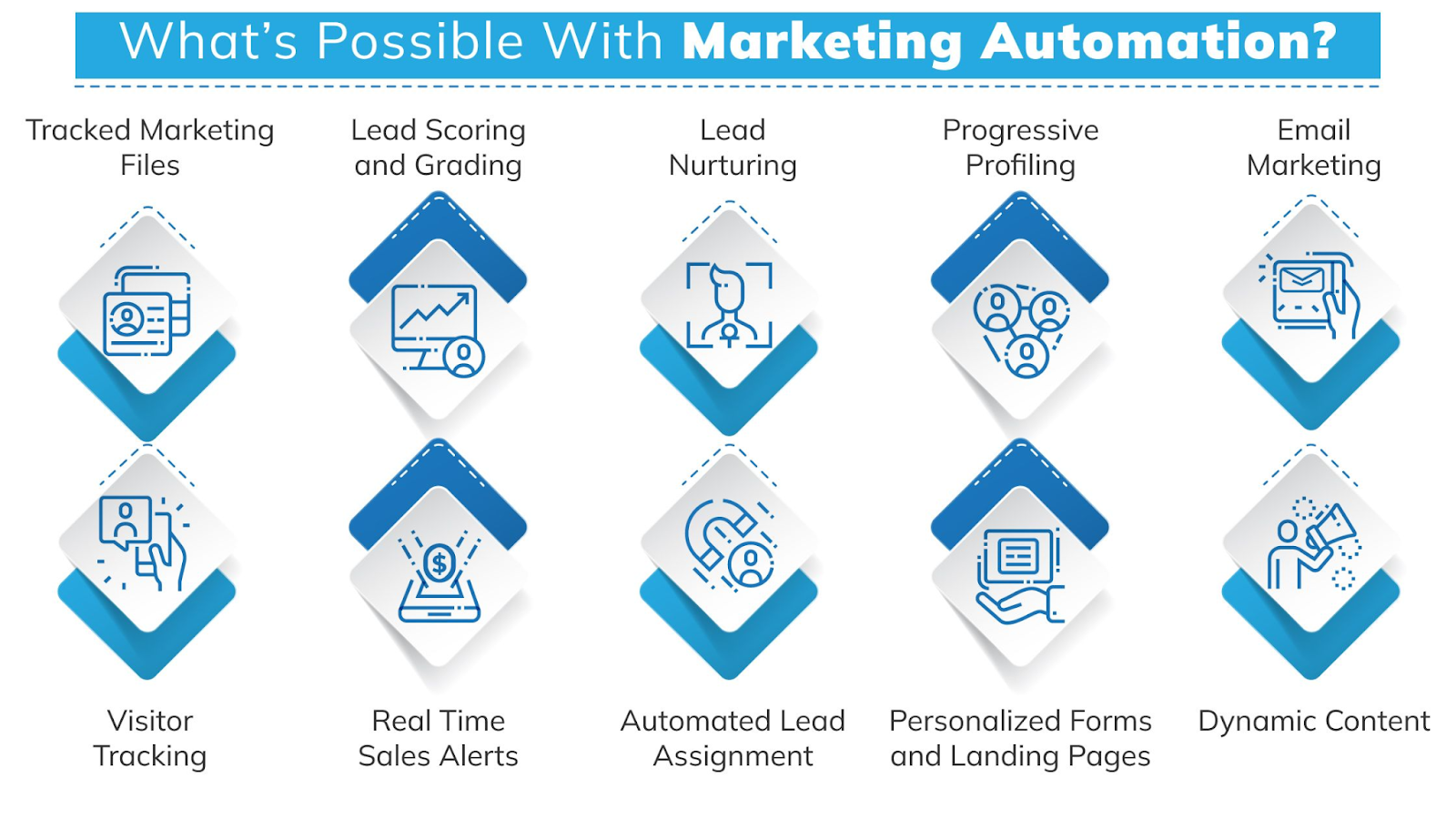
1. Automate Once, Profit Twice
When a process becomes automated, your team earns that time back every single day. Onboarding workflows, lead assignments, and recurring reporting are only the starting point.
As more of your operations standardize, the efficiency gains multiply. What used to require oversight becomes a dependable system running quietly in the background. Automation doesn’t replace your people. It empowers them to focus on strategy, creativity, and results instead of repetitive tasks.
2. Real-time Visibility Beats manual Reporting
Client reporting no longer needs to take hours each week. Live dashboards now give clients instant access to performance data. Metrics update in real time, so insights stay fresh.
Teams spend more time analyzing results, not assembling them. This agency transparency builds trust because clients see the value of your work anytime, not just when a PDF lands in their inbox.
The conversation shifts from recapping the past to planning what’s next.
AI-Driven Content Creation
AI has become a core creative partner for agencies. The change isn’t just that AI can write, it’s that it removes the friction of getting started. It eliminates the blank page problem and gives writers a strong foundation for storytelling and strategy.
1. From Blank Page to First Draft in Minutes
AI supports the early stages of content creation by providing:
- Topic ideation based on audience demand and keyword trends.
- SEO-informed outlines with logical flow.
- First drafts ready for brand voice refinement.
- Keyword mapping to boost visibility.
- Content variations for A/B testing and tone experiments.
Writers start smarter, not slower. And when paired with DashClicks’ white label content services, every piece goes through editorial review to ensure accuracy, tone, and quality.
2. The Blended Workflow Creates Stronger Content
AI gives content teams structure and speed. While humans bring context, emotion, and subject knowledge. It doesn’t replace creative work, but elevates it.
By handling the more mechanical parts of writing, AI frees people to spend their time shaping ideas and refining voice. As well as delivering insights that actually matter to readers. The result is content that is produced faster and connects more effectively with the audience.
3. AI Insights Inform What to Create Next
Smart content is not only about writing well. It is about knowing what will perform. AI analytics tools can reveal which topics and keywords resonate with audiences, helping agencies refine their strategy based on real behavior rather than assumptions.
4. Consistency Becomes Scalable
As agencies grow, maintaining quality across dozens or hundreds of deliverables becomes difficult. Automated templates, repeatable content frameworks, and shared knowledge built with AI help ensure every piece meets expectations.
Tone, structure, and SEO standards stay consistent no matter how many writers contribute or how quickly output increases. Teams gain confidence that quality will hold, even as demand rises.

Image Source: ClearVoice
Turning Data Into Insight
Data only matters when it drives better decisions. AI helps agencies move from reporting what happened to understanding why it happened and what to do next. It finds the patterns, predicts outcomes, and highlights where time or budget delivers the biggest return.
Within the DashClicks’ InstaReports Software reporting suite, AI analytics can help agencies:
- Identify which keywords, audiences, and campaigns deliver the highest ROI.
- Spot early signs of ad fatigue or performance dips.
- Forecast which strategies are likely to perform based on past data.
- Track how customers move through different channels and touchpoints.
- Surface optimization tips, such as when to scale or pause campaigns.
Automation should not just collect data. It should turn it into clear, actionable insights your team and your clients can use to make faster, smarter decisions.
Redefining Client Relationships in an AI-Powered World
When updates, reports, and notifications happen automatically, teams spend less time chasing data and more time having meaningful conversations about results and strategy.
Here’s what that looks like in practice:
- Clients get full transparency through real-time dashboards that show performance as it happens. No more waiting on reports or asking for updates.
- Check-in fatigue disappears because automated updates keep everyone informed without constant emails or meetings.
- Account managers shift into strategy mode, using live data to guide next steps instead of spending hours gathering metrics.
- Conversations become more proactive, focusing on opportunities, optimizations, and forecasting rather than status reports.
- Clients feel more connected to progress, since they can see results anytime, not just at the end of the month.
- Teams work with confidence, knowing clients already see the data they see, which reduces friction and miscommunication.
- Trust builds naturally because transparency and responsiveness are built into the process, not added on afterward.
Navigating the Risks and Ethics of AI Adoption
Agencies that adopt AI thoughtfully will earn long-term trust and credibility. How you use automation matters just as much as what it helps you achieve.
1. Quality Control Sets Leaders Apart
Anyone can generate content with AI, but the real differentiator is ensuring it meets high standards. Strong agencies integrate review and editing processes into their AI workflows.
They make sure every deliverable is accurate, on-brand, and polished, turning automation into a tool that strengthens rather than weakens client confidence.
2. Data Protection Built Into Workflows
Automated systems can actually improve security, but only if they are centralized, monitored, and carefully managed. Agencies that succeed take ownership of who can access data, how it is stored, and how workflows are audited.
By building security and compliance into automation, teams protect client information and avoid the risks that come from scattered tools or inconsistent practices.
3. Responsible and Transparent AI Use
AI should enhance human expertise, not replace it. Agencies that explain how they use AI, show where human oversight shapes results, and share insights into strategy build far stronger trust with clients.
Transparency turns technology from a black box into a visible advantage, demonstrating that automation is applied thoughtfully and ethically.

How Can DashClicks Help Agencies Deliver More High-Quality Content, Faster?
Even with the best AI tools, scaling high-quality content consistently requires human expertise, editorial oversight, and flawless execution. That’s where DashClicks’ White Label Content Services make all the difference.
We combine AI efficiency with expert human refinement, helping agencies produce premium, on-brand content at scale — without expanding internal teams.
Here’s what sets us apart:
- SEO-Optimized, Ready-to-Publish Content: Every piece is written and reviewed with ranking potential in mind — backed by real keyword and audience insights.
- Human Editors for Every Deliverable: AI helps speed up creation, but our editors ensure every article is engaging, accurate, and aligned with your client’s voice.
- Frictionless White Label Workflow: Manage projects, approve drafts, and track progress — all through your DashClicks dashboard.
- Scalable Without Compromise: Whether you need 10 or 1,000 pieces, our structured content frameworks ensure tone, quality, and consistency stay intact.
- Continuous Optimization: With built-in analytics and client reporting, you’ll know which topics and formats drive results — and where to double down.
DashClicks helps agencies deliver content faster, maintain brand quality, and impress clients effortlessly — all under your own brand name.
Human Oversight Remains Essential
AI can analyze, predict, and optimize, but it cannot make nuanced, ethical decisions on its own. Top agencies pair AI insights with human judgment to interpret results, check for bias, and ensure recommendations align with client goals.
The agency that combines human strategy and machine efficiency wins. The most successful agencies in the next decade will be those that treat technology as a partner, not a replacement.
Automation and AI deliver scale, accuracy, and speed. Humans provide creativity, empathy, and strategic insight. Together, they form the foundation of a new kind of agency. One that’s faster, smarter, and more client-centered.
If you’re ready to explore what that looks like, start small. Automate one process. Measure the impact. Expand from there. That’s how future-ready agencies are being built today, with a blend of human insight and machine efficiency.
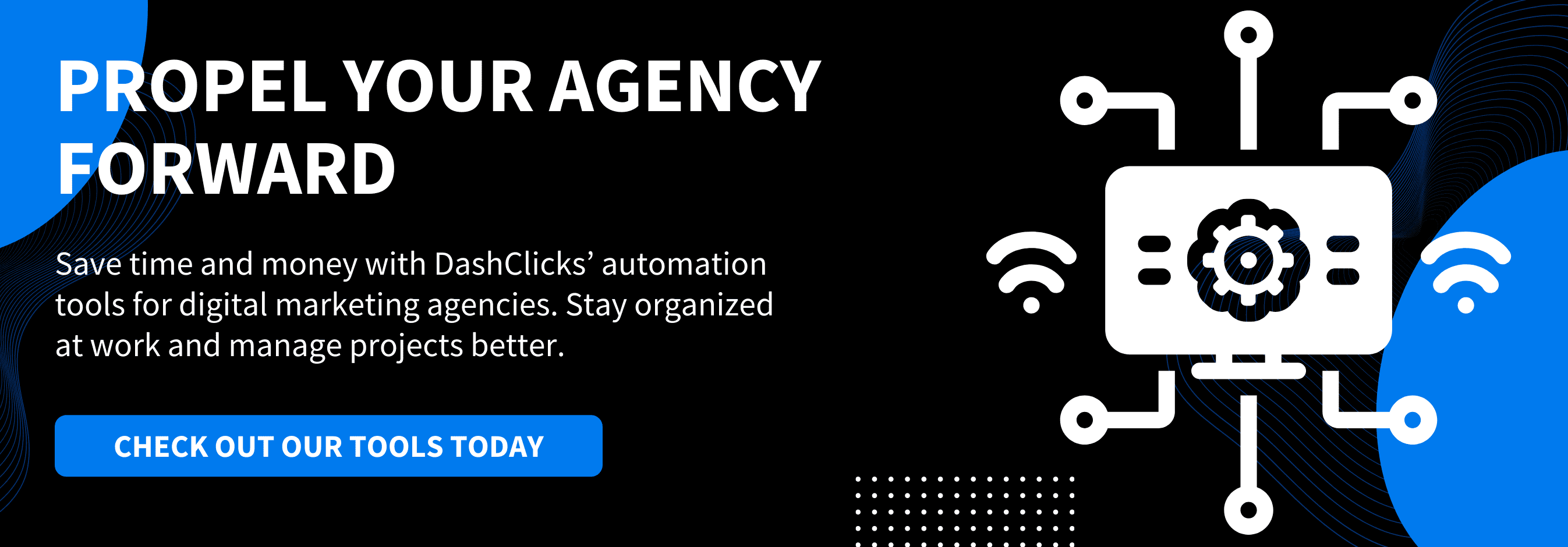

The Role of Scenario Planning Software in Project Portfolio Management
With the rise of AI solutions for businesses, scenario planning and project management forecasting software have become vital in optimizing processes and resources. Work that was done manually before and wasted a lot of resources can now be simplified by leveraging AI tools that act based on historical data, predicting potential outcomes, and best strategies. They simulate different scenarios, allowing businesses to make considered decisions and effectively deal with uncertainty.
Importance of Project Management Forecasting Software
Traditional planning often relies on manual spreadsheets and reports, where the risks of human factor mistakes are extremely high. We can highlight common challenges that companies face without implementing project management forecasting software:
- Difficulties in prioritizing tasks and projects.
- Balancing limited resources while meeting the demands.
- Difficulties in predicting and mitigating risks and changes.
- Difficulties while analyzing data and making informed decisions.
- Making decisions without data can cause conflicts.
But their main problem is a lack of real-time insights. They give a full picture of processes and problems that happen during project execution. Forecasting in project management is an essential process that brings several advantages to managers, executives, and other experts.
- It allows predicting risks in advance and effectively managing them.
- It provides control over costs and deadlines, ensuring that the project will be delivered on time within budget.
- It ensures better coordination of projects and resources across the portfolio.
- It saves experts’ time, allowing them to focus on the company’s strategy and growth.
- It also saves costs, giving the opportunity to invest in more important initiatives.
- It allows predicting delivery dates based on current progress and resource availability.
- By detecting bottlenecks early, it enhances quick adjusting of resources to these changes.
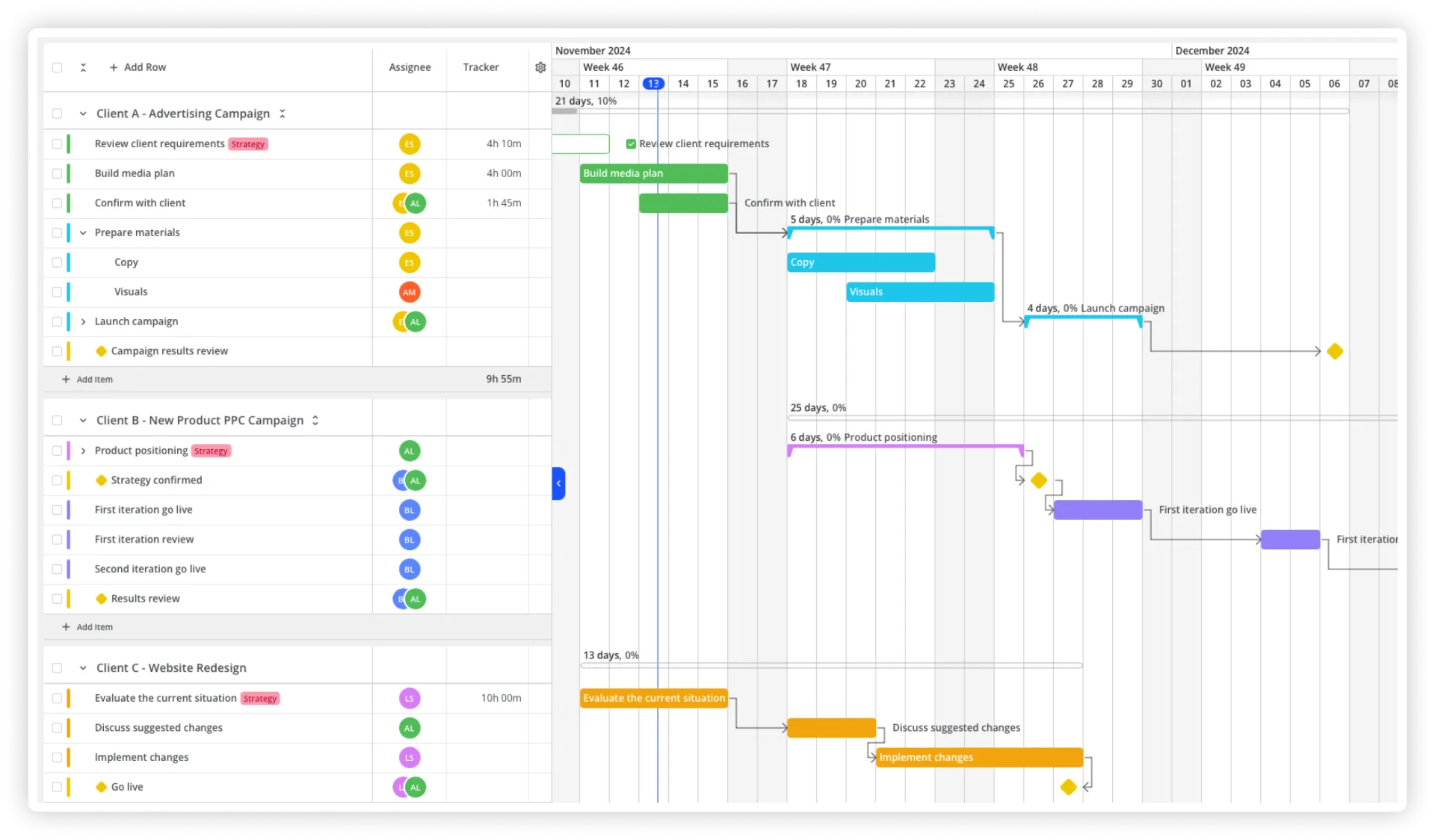
Image Source: Teamhood
How Scenario Planning Software Elevates Decision-Making?
In a rapidly changing business environment, decision-making cannot depend on intuition or static reports alone. Scenario planning software gives leaders the power to model different “what-if” situations before committing to a strategy.
For instance, managers can simulate how a sudden resource shortage, a shift in client demand, or a delayed milestone would affect multiple projects simultaneously. The ability to run simulations across time horizons and resource constraints helps organizations prepare contingency plans, not react to crises after they occur.
This kind of proactive management enables companies to:
- Visualize how various decisions influence timelines and budgets.
- Identify the most resilient strategies under uncertainty.
- Maintain agility by pivoting to the most favorable scenario.
- Reduce financial and operational risks across portfolios.
In short, scenario planning transforms project portfolio management from reactive problem-solving into predictive strategy design.
5 Features of Project Management Forecasting Software You Need to Try
Modern project management forecasting software tools have critical capabilities that make them irreplaceable for project prioritization and risk management. The most vital features are the following:
- What-if scenario planning allows testing different scenarios in an independent environment before implementing real changes in projects.
- Workload forecasting shows the future workload of resources, allowing detection of overload in advance and reallocation of resources if needed.
- Advanced predictive analysis is essential for project and task prioritization that helps to predict bottlenecks and overload, making processes more efficient for organizations and delivering projects on time.
- AI agent project managers are innovative tools but already have a strong position in the market. It is artificial intelligence software that acts like a smart project manager with the ability to detect bottlenecks and alert about them, send reminders about some routine tasks, and help real managers and executives with proper resource allocation.
- Automatic schedule adjusting replans due dates to deliver projects with minimum harm if delays because of resource overload or limited capacity are detected.
Experts use these tools to gain real-time information important to improve project and resource planning. Maximum value of these features is given to multi-project environments where it is vital to stay on track with all processes across the project portfolio.
Benefits of Integrating AI into Project Forecasting
Artificial Intelligence is reshaping how organizations predict, plan, and allocate resources. When integrated into project forecasting, AI acts as an analytical engine that learns from historical data, identifies recurring patterns, and anticipates potential outcomes.
Key benefits include:
- Enhanced Accuracy: AI-driven predictions reduce human error by using vast data sets to identify trends that manual methods overlook.
- Proactive Risk Detection: Machine learning models flag potential bottlenecks and performance issues early, allowing preventive action.
- Smarter Resource Allocation: AI algorithms balance workloads and optimize capacity across multiple projects simultaneously.
- Faster Decision-Making: AI eliminates guesswork by providing clear recommendations backed by data.
By automating repetitive processes, AI frees up managers to focus on innovation and leadership rather than data crunching — helping organizations become more strategic and less reactive.
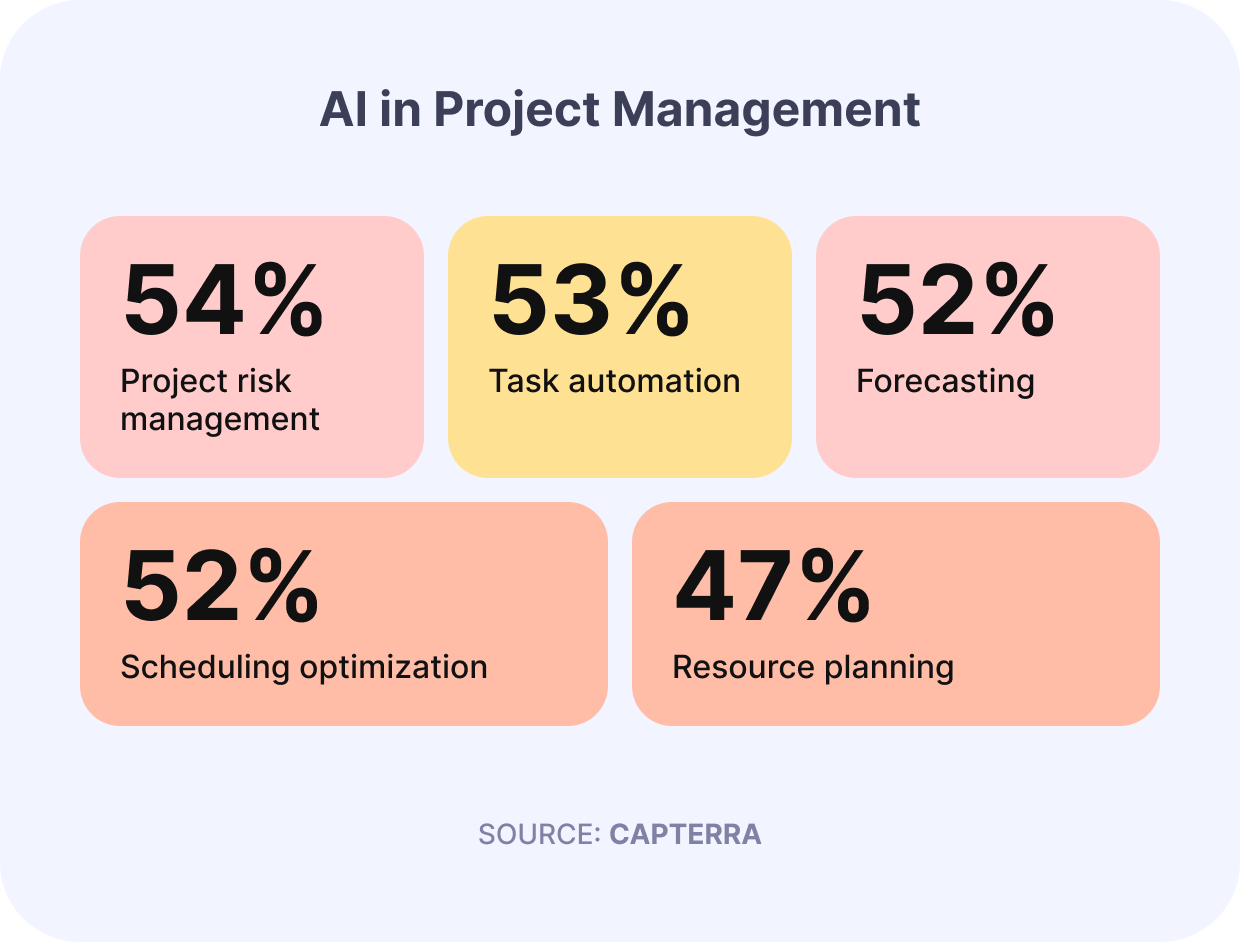
Image Source: Productive
Scenario Planning in Action: Real-World Use Cases
Scenario planning isn’t a theoretical exercise — it’s a practical necessity across industries:
- Technology Companies use forecasting tools to manage overlapping software development cycles and coordinate sprints across distributed teams.
- Construction Firms apply scenario models to predict material shortages or project delays caused by weather or supply chain issues.
- Financial Institutions rely on predictive simulations to anticipate budget overruns or workforce fluctuations in large-scale projects.
- Healthcare and Pharma use scenario analysis to plan research initiatives, clinical trials, and regulatory timelines while managing limited skilled resources.
In each case, the combination of forecasting and scenario modeling enables smarter risk management and more reliable delivery timelines, even in unpredictable environments.
Choosing the Right Project Management Forecasting Software
Selecting the right forecasting tool is just as important as implementing it. Organizations should evaluate solutions based on these criteria:
- Integration Capabilities – The software should easily integrate with existing tools like Jira, MS Project, or Salesforce to centralize data.
- Scalability – It must support growth, from small teams to enterprise-level portfolios.
- Ease of Use – A user-friendly interface ensures adoption across departments.
- Predictive & Analytical Power – Advanced analytics and AI-based insights should drive smarter forecasting.
- Customizable Dashboards – Real-time visibility of KPIs, workloads, and timelines for data-backed decision-making.
- Security & Compliance – Strong data protection standards to maintain project confidentiality.
Choosing software that meets these benchmarks ensures organizations get long-term value rather than just short-term convenience.
Future of Scenario Planning and Forecasting in Project Management
The future of project portfolio management is moving toward predictive and autonomous systems. Emerging trends show how technology is reshaping the landscape:
- Generative AI will soon assist in crafting optimal project plans and generating alternative schedules automatically.
- Digital Twins of projects will simulate the entire portfolio in a virtual space, allowing experimentation before real-world execution.
- Autonomous Project Management Systems will independently adjust timelines and resource assignments as conditions evolve.
- Cross-Platform Analytics will connect financial, HR, and operational data to offer a unified picture of organizational performance.
As these innovations mature, project forecasting software will become less of a support tool and more of a strategic partner — capable of self-correcting and guiding projects toward successful outcomes.
How DashClicks’ Project Management Software Enhances Forecasting and Scenario Planning?
To make accurate forecasts and actionable plans, you need more than data—you need organization, visibility, and execution control. That’s where DashClicks’ Projects Management Software comes in.
It provides a unified workspace for teams and agencies to plan, track, and optimize every project with clarity and precision. Key benefits include:
- Task & Workflow Automation: Streamline repetitive tasks and focus on high-impact activities.
- Resource Management: Assign workloads intelligently and monitor team utilization in real time.
- Real-Time Collaboration: Keep every stakeholder aligned through shared dashboards and instant updates.
- Performance Tracking: Monitor progress and KPIs with in-depth reporting and analytics.
- Client Transparency: Deliver complete visibility into project progress through branded dashboards—ideal for agencies handling multiple clients.
By combining scenario planning with powerful execution tools, DashClicks ensures your projects stay predictable, measurable, and scalable—turning strategic forecasts into tangible outcomes.
Summary and Concluding Thoughts
Using project management forecasting software plays an important role in navigating risks and fighting the uncertainty. Scenario planning and forecasting software empowers organizations to:
- Run different scenarios and see potential outcomes before changes are made.
- Effectively balance resources across the portfolio.
- Quickly adjust to changes, increasing ROI.
- Effectively manage and prevent risks.
Adopting these tools helps companies to deliver more value with the same resources to stay competitive and expand into new markets. A project management forecasting software gives an excellent opportunity to enterprises that are looking for new innovative instruments to succeed.
Frequently Asked Questions (FAQ)
Q1. Why is forecasting software important in project portfolio management?
Ans. Project management forecasting software is important because it gives leaders real-time data-driven insights and helps to predict resource needs, delivery dates, and risks before they affect the portfolio.
Q2. What are the main features of project management forecasting software?
Ans. The main features include what-if scenario planning, workload forecasting, advanced predictive analysis, AI agent project managers, and automatic schedule adjusting.
Q3. How does scenario planning software improve project decision-making?
Ans. Scenario planning software allows project managers to test multiple “what-if” situations before making decisions. This ensures choices are based on data, not assumptions, minimizing risks and costly missteps.


Unlock Hidden Revenue: How Auditing Marketing Automation Tools Improves Agency Performance
In the rush to scale and serve more clients, many digital marketing agencies overlook one of their most valuable internal assets: their own tech stack. Particularly, marketing automation tools—designed to streamline agency operations, increase productivity, and boost campaign ROI—often go unexamined once deployed. Over time, what once felt like a streamlined engine can quietly become a bloated, misfiring system. And when automation loses its edge, it doesn’t just affect efficiency; it eats into profit.
This article explores how auditing marketing automation tools can reveal untapped revenue streams, eliminate inefficiencies, and ultimately improve agency performance, not through new client acquisition, but by making existing systems smarter, faster, and more cost-effective.
The Hidden Cost of Outdated Automation
Marketing automation tools are often implemented during a growth phase, when agencies are eager to delegate repetitive tasks, improve lead nurturing, or manage client accounts at scale. These tools might include CRMs, email marketing platforms, lead scoring systems, and scheduling software. While beneficial early on, these systems tend to grow stale over time.
What begins as a lean tech stack can evolve into a cluttered ecosystem of overlapping tools, unused features, misaligned workflows, and unnecessary costs. These inefficiencies manifest subtly: leads aren’t properly segmented, drip campaigns stagnate, reporting becomes inconsistent, or team members duplicate work.
Even worse, old automations can become so rigid that they prevent experimentation—a critical function in an ever-evolving digital market. Without regular review, agencies may be unknowingly held hostage by the very tools that once promised freedom.

The marketing automation market has expanded significantly in the last several years. At a compound annual growth rate (CAGR) of 9.5%, it will increase from $6.79 billion in 2024 to $7.44 billion in 2025. This growth indicates the increasing reliance on marketing automation tools in the industry. However, it also highlights the importance of regularly reviewing and updating these tools to ensure they continue to provide value and efficiency for agencies.
One of the biggest reasons agencies fall into inefficiency is juggling too many disconnected tools. Overlaps creep in, data gets siloed, and costs multiply. DashClicks solves this by offering an all-in-one platform where agencies can manage reporting, client communication, and workflow automation in one place. Instead of switching between multiple logins and systems, teams get a single streamlined hub that keeps operations lean and effective.
Why an Audit Isn’t Optional?
Auditing marketing automation tools should be viewed not as a luxury, but as a mandatory operational health check. Agencies that fail to audit run the risk of falling behind, not only in technology but in service delivery and revenue optimization.
Here’s what a marketing automation audit uncovers:
- Redundant or underutilized tools that inflate tech costs without meaningful ROI.
- Ineffective sequences that decrease engagement and weaken conversions.
- Data inconsistencies that erode decision-making and analytics integrity.
- Workflows are misaligned with updated business goals or client expectations.
- Missed integration opportunities between tools that could otherwise communicate more efficiently.
This isn’t about catching errors—it’s about optimizing potential. Every inefficiency, every bottleneck, every wasted click is a lost opportunity for revenue.
Audits reveal hidden inefficiencies, but the challenge is turning those insights into clear action. DashClicks’ marketing analytics software makes this easier by giving agencies real-time visibility into campaign performance and automation outcomes. With branded dashboards and detailed metrics, teams can immediately identify which automations are working, which are underperforming, and where revenue opportunities are being left on the table.
The Strategic Role of a Marketing Automation Tools Review
Understanding how different platforms deliver on both efficiency and ROI is critical in today’s competitive landscape. That’s why decision-makers often turn to expert comparisons before committing to any solution.
A thorough marketing automation tools review evaluates more than functionality. It investigates performance, adoption, and strategic alignment. A good audit answers these questions:
A comprehensive review of marketing automation tools also uncovers how well each platform adapts to evolving campaign needs and user behavior trends. This kind of analysis is invaluable for businesses scaling fast, where automation must not only streamline workflows but also support long-term growth strategies.

Image Source: Act
A good audit answers these questions:
- Are the tools being used to their full capacity?
- Which automations are producing measurable results?
- Where are there gaps in automation that cause manual labor?
- Are users trained and comfortable with the system?
- Is data syncing correctly across platforms?
Without clear answers to these, agencies risk building processes on sand.
This review also provides a critical lens into the client experience. Is lead communication timely? Are touchpoints personalized? Is the reporting clear and actionable? The way a tool functions behind the curtain directly influences how an agency appears on stage.
An ad strategy is only as strong as the systems supporting it. It is crucial for agencies to regularly assess and optimize their automation processes to ensure efficiency and effectiveness in their campaigns.
Revenue Isn’t Always About More Clients
Many agencies equate revenue growth with increasing client volume. While client acquisition is a valid strategy, it's often more expensive and risky than optimizing internal operations.
A marketing automation audit helps agencies identify:
- Faster deal cycles by refining lead nurturing flows.
- Lower client churn by ensuring consistent, valuable communication.
- Increased upsell/cross-sell rates through better segmentation.
- Reduced overhead by eliminating duplicate tools or tasks.
- Smarter resource allocation via clearer reporting and team roles.
These shifts can increase margins without requiring an increase in headcount or advertising spend. Agencies can do more—with less—and do it better.
Improving client retention and upsell opportunities often comes down to communication and transparency. DashClicks’ InstaReports software helps agencies deliver professional, branded reports without hours of manual work. By showing results clearly and consistently, agencies strengthen client trust, reduce churn, and create natural opportunities for upselling additional services.
Building a Framework for Auditing
An effective audit isn’t a one-time event; it’s a repeatable, scalable framework. Here’s a breakdown of what that can look like:
- Inventory the Stack: Start by cataloging every marketing automation tool in use—paid or free. Note who uses it, how often, what it does, and what it costs. Most agencies are surprised to find outdated subscriptions still charging monthly fees or tools performing duplicate tasks.
- Analyze Performance Data: Dive into KPIs: email open rates, lead conversions, pipeline velocity, customer engagement scores, etc. Tie these back to specific automations and see what’s driving success—or dragging it down.
- Interview Internal Teams: Your team knows where the pain points are. Conduct short interviews or surveys asking what works, what’s clunky, and where they see opportunities.
- Evaluate Integrations: Disjointed tools force manual data entry, slow reporting, and increase the likelihood of errors. Review whether your stack is integrated properly, and identify any gaps that could be bridged via APIs or native connectors.
- Assess Data Quality: Outdated or siloed data undermines every marketing effort. Evaluate how clean, current, and accessible your data is across platforms.
- Map Tools to Business Goals: Every tool should serve a measurable purpose. If it doesn’t directly impact a business metric—leads, conversions, retention—it’s time to question its value.

Image Source: WillDom
Pitfalls to Avoid During the Audit
While the benefits of auditing are clear, many agencies fall into the trap of shallow or misguided reviews. Common pitfalls include:
- Focusing only on cost: Cheaper tools aren’t always better. Performance and fit matter more than price.
- Ignoring user feedback: Automation tools are only as good as their adoption. If the team resists, efficiency suffers.
- Failing to act on findings: An audit without follow-up is just another report collecting dust.
- Overcomplicating systems: Sometimes, simplifying is the smartest upgrade.
Beyond the Audit: Implementing Change
The real magic happens after the audit. Once inefficiencies are identified, agencies can:
- Consolidate or eliminate unused platforms.
- Redesign automation workflows to align with customer journeys.
- Reallocate budget from bloated tools to areas that drive results.
- Provide retraining for team members to boost tool usage and effectiveness.
- Align reporting structures to reflect updated goals.
This post-audit phase is where hidden revenue becomes visible—where ghost costs are banished and friction points get converted into fluid, revenue-generating processes.
The Competitive Edge
In a crowded digital services market, performance is the ultimate differentiator. Clients aren’t just hiring agencies for ideas—they expect flawless execution. If an agency’s own automation stack is holding them back, it reflects in their delivery. Faster onboarding, smarter reporting, tighter segmentation—these things don’t just happen. They are built.
By auditing their marketing automation tools, agencies position themselves to outperform—not just externally, but internally. Efficiency becomes a brand advantage. Brand marketing agencies that invest in optimizing their automation tools are able to streamline their processes, leading to improved client satisfaction and increased profitability. Ultimately, staying ahead of the competition in the digital services market requires a commitment to continuously improving and evolving automation strategies.
Auditing Isn’t a Chore. It’s a Strategy.
Most agencies look outward when seeking growth: new markets, new clients, new services. But the answer might already be inside—buried in the automation logs, dusty CRM records, and forgotten sequences.
Auditing marketing automation tools isn’t just housekeeping. It’s strategic renewal. It invites clarity. It redefines performance. And in a world that rewards speed, intelligence, and adaptability, that clarity can be the sharpest competitive edge.
Before launching the next campaign or chasing the next client, take a breath. Look inward. Unlock what’s already there.


How Agencies Can Use AI for Safer and Smarter Financial Decisions
How confident are you that your agency’s financial decisions are fully protected against hidden risks?
Currently, we live in a world where billions move across digital platforms every second. A single weak link in your security can expose you to devastating losses.
Nowadays, your organization will have to be aware of sophisticated cyber threats. These range from cunning fraud rings to malicious malware attacks. Combined, this leaves you no margin for error!
In addition to these challenges, modern customers have come to expect instant payment and seamless transactions, along with a zero-tolerance policy for errors.
This is where Artificial Intelligence (AI) steps in to save the day.
With AI, you can process vast streams of your financial data in real time. Instead of relying on outdated and time-consuming checks. This is your call to join the AI revolution. Don’t get left behind in the dust!
The Role of AI in Cybercrime Defense
Cybercrime is increasing by the second in the modern digital universe. It has become highly sophisticated and operates at an unprecedented scale now.
Financial institutions report billions of dollars in attempted fraudulent transactions annually. This is where criminal networks exploit multiple channels of attack. These include:
- Online Banking
- Digital Wallets
- Cross-Border Payments
Fraudsters often use automated systems to move their funds quickly. This fast movement often bypasses conventional detection methods.
How is it possible to maintain your financial security under such duress?
Look no further than AI. AI has become a critical solution to these challenges. Advanced machine learning models work by analyzing vast streams of transaction data. Then they can identify anomalies that indicate potential money laundering or fraud.
These models incorporate aspects like:
- Supervised Learning
- Unsupervised Learning
- Graph Analytics to Map Relationships
They apply this information between accounts to detect any kind of unusual activity.

Image Source: GeeksforGeeks
How AI Enhances Anti-Money Laundering (AML) Processes?
AML is a system of regulations and internal safeguards. They are specifically designed to prevent criminals from concealing the origins of illegal funds.
This AML is the foundation of modern financial integrity. Any unchecked money laundering could potentially enable tax evasion and organized crime to flourish. You must be aware that your agency will be required to:
- Verify Your Customer Identities
- Monitor All Transactions
- Report Unusual Behavior to Regulators
The sheer speed and amount of attacks have increased these days. This is why machine learning and AI used for AML have become essential tools for your arsenal. Industry leaders like SEON provide excellent services in this regard to ensure your financial security.
Supervised machine models learn from labeled historical data. Hence, they can recognize suspicious traits immediately. On the other hand, unsupervised models can detect new laundering strategies. Particularly those that do not fit existing patterns.
These platforms come equipped with advanced graph analytics. They highlight hidden links between accounts that appear separate but share concealed connections. Often, these types of connections are used in layering schemes.
Together, these tools help your teams to separate genuine threats from harmless anomalies.
Location-Based Intelligence for Safer Financial Operations
In the modern digital universe, your agency must deal with financial transactions across multiple regions and jurisdictions. Each transaction carries potential risks that vary depending on the:
- Origin of the Payment
- Device Used
- Account’s Historical Behavior
Exposing high-risk activity is significantly more difficult without accurate location data. This is why location-based intelligence is needed. It provides you with the right context to understand what a transaction is and where it is coming from. As well as how it fits into the broader financial network.
Technology to Interpret Geographic Data
Certain jurisdictions carry higher regulatory scrutiny. They may also be more frequently associated with illicit activity.
Thus, you need to integrate these geographic insights into your monitoring and compliance workflows. Here, you need to evaluate each transaction against this geographic context. That way, you can identify potential exposure.
Once again, AI systems use various data points to isolate and prevent these types of attacks. These include:
- IP Addresses
- Mobile Device Locations
- Regional Transaction Patterns
- Transaction Timing
- Behavioral History
Ultimately, they use this location data to enhance their decision-making. Machine learning models combine this geolocation information with the data points to calculate dynamic risk scores.
So what do you do when a transaction’s location deviates from established norms?
Fear not, the AI will take care of it. AI evaluates the behavior of the user before taking any action. Consequently, it will only issue an alert when the risk threshold is exceeded. These actions dramatically reduce false positives for threats. As well as allowing your compliance team to focus on genuine threats.
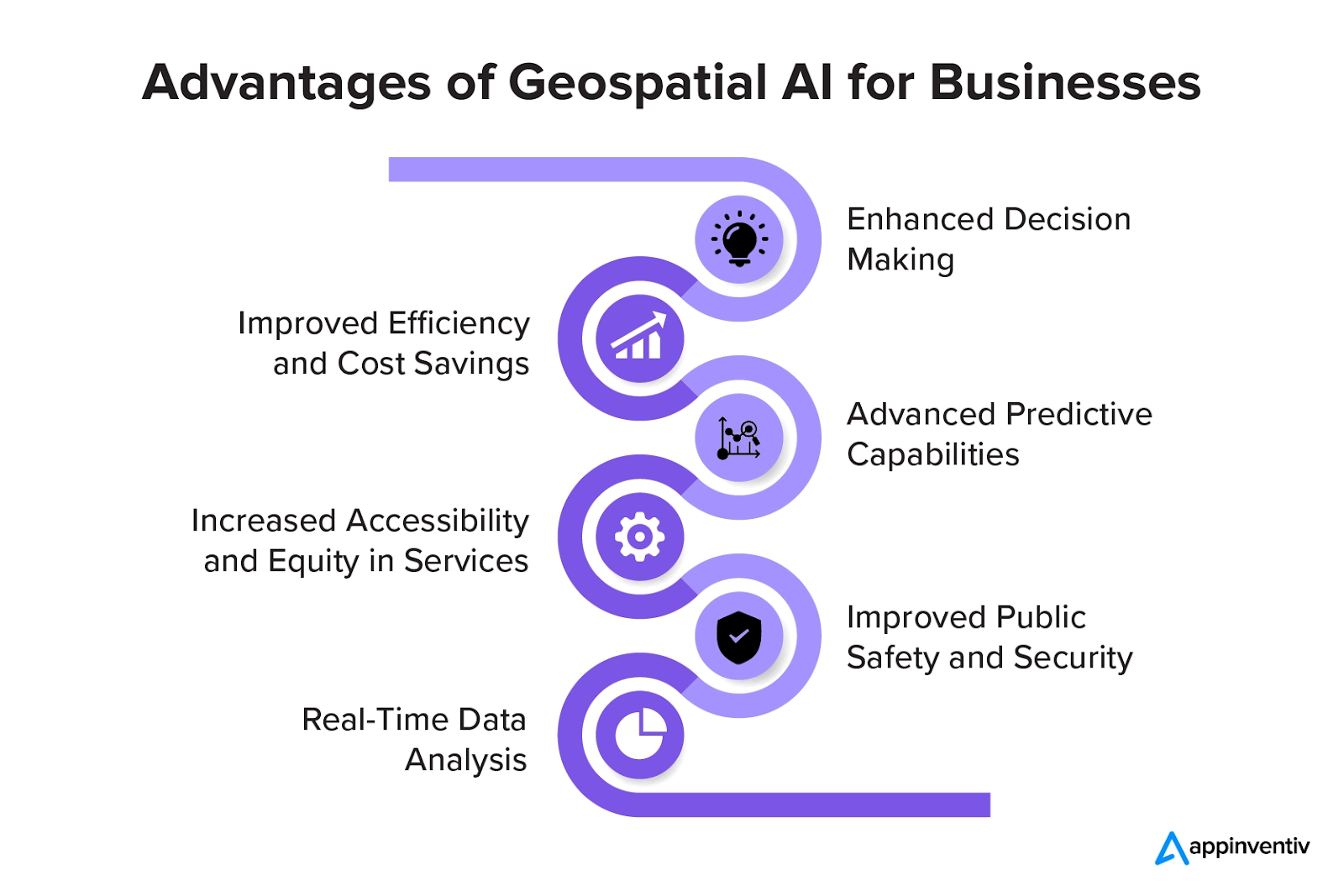
Image Source: Appinventive
How Geographic Data Strengthens Financial Security?
You now need precise tools to evaluate the origin of your financial transactions. It will also help to assess their associated risk.
One of these advanced tools is an API, or Application Programming Interface. An API is a set of rules and protocols. They allow one software system to communicate with another efficiently and securely.
In this context, an IP Geolocation API, like those made by Ipinfo, translates network identifiers into detailed geographic information. Collectively, this will provide you with the exact physical location from which any transaction originates.
This has become an essential component of detection patterns for potential fraud events within your organization.
Slick Financial Workflows Through Advanced Payment Software
All modern businesses require some kind of payment software to accept money from customers. This will allow you to process and settle your transactions at scale.
This advanced technology acts as the bridge between your customers and your financial institutions. These groundbreaking systems can:
- Transfer Money
- Authenticate Users
- Manage Currency Conversions
- Route Payments Through the Most Secure Networks
If your company uses an e-commerce platform, your payment software will manage checkout flows and perform fraud screens for all actions.
In retail, they can synchronize card readers with your cloud systems that track revenue. Within the B2B trade, these platforms support:
- Recurring Invoicing
- Contract-Based Billing
- Multi-Currency Settlements
It adds up to another layer of protection for your sensitive financial assets.
AI-Powered Workflow Optimization in Payment Platforms
Payment platforms now all integrate AI to coordinate their intricate financial operations with precision. These systems examine:
- Transaction Sequences
- Account Interactions
- Settlement Timeline
Using this information, they can identify subtle inefficiencies in your network. They pinpoint anything that could disrupt your cash flow or delay reconciliations.
Their machine learning models can recognize patterns in user behavior. This, in turn, will help you anticipate peak transaction volumes. Then you can adjust your processing resources accordingly.
These platforms can automatically correct minor mismatches between your invoices and payments. This reduces the need for human intervention and prevents errors from compounding across your system.
At the same time, predictive algorithms in this software will analyze all your historical payment trends. This is done to guide:
- Resource Allocation
- Forecast Liquidity Requirements
- Ensure Operational Continuity
Optimize Sales Funnels with AI
A sales funnel represents the complete journey of a prospect. It begins with the initial contact and ends with the final purchase or contract agreement.
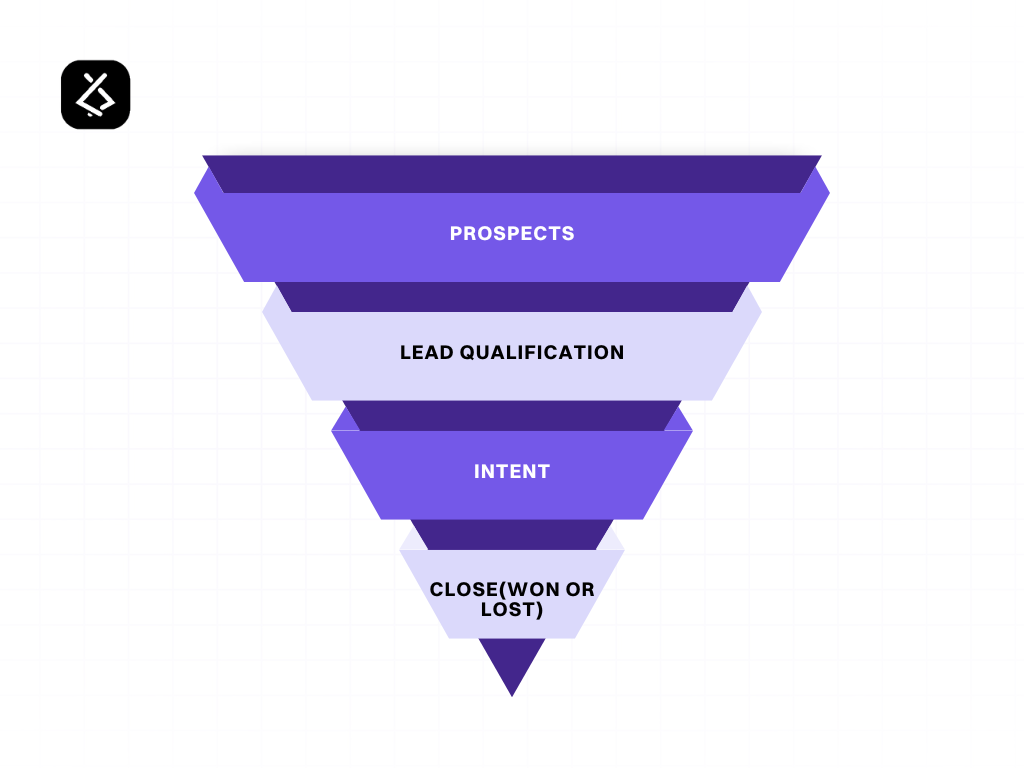
Image Source: Lyzr
Every stage of the funnel will affect your:
- Revenue
- Cash Flow
- Operational Planning
These factors will dramatically impact the decision-making in your agency. Artificial intelligence now provides tools to monitor this journey from every angle. Naturally, it will also deliver actionable insights that can help to solidify your financial strategy.
AI rapidly examines lead behavior and engagement patterns to determine conversion probabilities and highlight bottlenecks in the funnel. For example, platforms like HubSpot use AI-driven CRM features to score leads, forecast deal outcomes, and recommend the best next step for sales teams. If you embed tools like this into your funnel, you can reduce uncertainty and gain measurable, data-driven guidance for each stage.
Streamline Funnels with DashClicks’ White Label Funnel Builder
Building and managing sales funnels can feel overwhelming—multiple tools, disconnected analytics, and endless manual tweaks. The Funnel Builder Software by DashClicks solves this by giving agencies a fully integrated, white-label funnel builder that works seamlessly from lead capture to conversion.
With its intuitive drag-and-drop interface, agencies can design high-converting landing pages, opt-in forms, upsell flows, and checkout pages—all within minutes, no coding or external plugins needed. Each funnel comes fully branded, so your clients only see your agency’s identity, never the backend provider.
But the real power comes from intelligence. The funnel builder software doesn’t just help you build; it helps you optimize. AI-driven insights show you where prospects are dropping off, which touchpoints are driving the most conversions, and what steps need refinement. Automated reporting makes it easy to present these insights to clients in clear, actionable terms, strengthening both transparency and trust.
For agencies, this means less time juggling multiple tools and more time focusing on strategy and growth. Whether you’re serving e-commerce businesses, service providers, or B2B companies, DashClicks’ funnels adapt to any client niche. And because everything is hosted under your white-labeled brand, you scale your services without ever sacrificing credibility.
In short, DashClicks’ funnel software transforms funnels from static “pipelines” into dynamic, data-driven growth engines—helping your agency and your clients convert more, faster, and smarter.
Intelligent Segmentation and Resource Allocation
How can you ensure that you allocate resources effectively in your sales funnel? Especially when every prospect behaves differently and carries a different potential value!
Every lead will require the same level of attention or engagement in order to convert into a sale. For this, AI analyzes multiple factors to divide prospects into meaningful groups. Such as:
- Engagement Patterns
- Purchase History
- Behavior Trends
- Projected Revenue Potential
We suggest you organize leads in this manner. Then your agency can prioritize high-value accounts for personalized outreach. At the same time, you can automate interactions with lower-priority prospects. These practices will increase operational efficiency across your entire team.
This approach has several benefits, such as:
- Reducing Wasted Effort in Your Teams
- Ensuring Your Marketing Budgets Are Invested Strategically
- Improving Your Conversion Rates
From a financial perspective, it makes sense to group all your prospects into categories. This effectively helps you to forecast your revenue with the highest degree of accuracy. As well as anticipating your cash flow variations, and maintaining your operational stability. It also allows your agency to spot potential policy abuse, such as repeated attempts by users to exploit discounts or bypass system safeguards, ensuring your resources are protected and compliance is maintained.
Transform Your Financial Strategy Today
These days, there is a plethora of AI tools available to help you. They can effortlessly assist your financial decisions with clarity.
These cutting-edge tools can readily transform your detailed data into actionable insights. As they work to uncover patterns and trends in your networks. Afterwards, their insights can be turned into strategic opportunities by your team.
Agencies that embrace these intelligent systems always experience safer financial management. Are you ready to join in the action?


SEO Automation: 5 Tasks to Automate for Better Results
Are you looking to speed up and improve your SEO process? Automation is the way of the future, allowing businesses to do more work faster while cutting costs. In this blog post, we'll provide insights into five SEO tasks that can be automated for better results.
We'll cover everything from optimizing keyword density to automating backlinks research and building a presence on social media networks.
By leveraging automation technology in these areas, you'll reduce manual errors while maximizing organic search engine optimization efforts and quickly scaling campaigns for greater success.
What Is SEO Automation?
SEO Automation refers to the process of using tools, software, or other technologies to perform tasks related to Search Engine Optimization (SEO) without the need for manual intervention.
It includes a broad range of activities, such as keyword research, link building, content optimization, and rank tracking. The primary goal of SEO Automation is to streamline time-consuming tasks, improve efficiency, and enhance the accuracy of SEO strategies. By automating these processes, businesses can focus on strategic planning and creative tasks, while the technology handles the repetitive, labor-intensive tasks.
Furthermore, SEO Automation allows for real-time data analysis, predictive insights, and continuous optimization, which can significantly boost your website's visibility and ranking on search engine results pages (SERPs).
Here is how SEO automation work -

Image Source: WordLift
Benefits of SEO Automation
There are several benefits of SEO automation for your business. Let's look at them in detail:
- Scalability: With automation in place, businesses can quickly scale their SEO efforts without the need for additional resources. It is especially useful when handling large volumes of data or managing multiple websites.
- Efficiency and Time-Savings: Automation significantly reduces the time spent on repetitive and labor-intensive tasks such as keyword research and link building. This efficiency frees up time for other important tasks like strategic planning and creative work.
- Accuracy and Consistency: Automated SEO tools are designed to minimize human errors, ensuring accuracy and consistency in tasks like content optimization and rank tracking. They provide reliable and precise data, which is critical for successful SEO strategies.
- Scalability: SEO automation allows businesses to scale their SEO efforts with ease. Whether you need to expand keywords, increase backlinks, or optimize more pages, automation helps you do it faster and more effectively.
- Real-Time Data Analysis: Automation tools offer real-time data analysis, providing immediate insights into your website's performance. This ability to evaluate and adjust strategies in real-time is invaluable for improving your website’s SERP rankings.
- Predictive Insights: Advanced automation tools can provide predictive insights based on historical data and trends. These insights can help businesses anticipate changes in SEO practices and stay ahead of the competition.
- Continuous Optimization: SEO is an ongoing process, and automation allows for continuous optimization. Tools can constantly monitor and tweak your SEO strategies, ensuring your website remains optimized and relevant.
- Cost-Effective: While there might be initial costs in setting up automated SEO systems, in the long run, the increase in productivity and efficiency makes SEO automation a cost-effective strategy. It also reduces the likelihood of costly mistakes made through manual errors.

Image Source: AIContentfy
5 SEO Tasks You Can Automate
As we delve deeper into the realm of SEO automation, it's essential to identify specific tasks that can benefit from this technology. Automation not only expedites these tasks but also enhances their precision and effectiveness.
Here, we outline five key SEO tasks that you can automate to improve your website's performance and ranking on the SERPs. From keyword research to social media posting, these tasks, when automated, can significantly streamline your SEO workflow, allowing your team to focus on more strategic, creative aspects of your digital marketing strategy.
1. Keyword Research
Keyword research is a fundamental SEO task that can be significantly streamlined through automation. The purpose of keyword research is to identify the words and phrases that potential customers enter into search engines when looking for products or services similar to yours. Automated keyword research tools can help you collect data on these target keywords, and their related search terms without manual effort.
Automated keyword research tools crawl the web and use complex algorithms to find and analyze relevant keywords and their corresponding search volumes, competitiveness, and relevance to your business. This data is invaluable for selecting the most effective keywords to incorporate into your SEO strategy.
Moreover, these tools can continuously monitor and update this data in real-time, providing insights into evolving search trends and allowing you to adjust your keyword strategy accordingly. This continuous, automated keyword research keeps your website content fresh and relevant, contributing to better rankings on the SERPs.
2. Competitor Analysis
As the digital arena becomes increasingly competitive, understanding and monitoring your competitors' SEO strategies is critical. Automated competitor analysis tools offer a proactive approach to this task by constantly tracking your competitors' online presence and their SEO tactics. These tools can analyze and report on a myriad of factors, including their targeted keywords, backlink profiles, social media engagement, and website structure.
By automating competitor analysis, you can gain insights into their successful tactics, areas of weakness, and untapped opportunities, all without manually scouring through their websites and social media pages. This real-time, in-depth data allows you to adapt your SEO strategies quickly, helping you maintain or improve your competitive edge.

Moreover, it aids in identifying emerging trends, enabling you to stay ahead of the curve and adjust your strategies accordingly. In essence, automated competitor analysis is a powerful means to refine your SEO efforts and improve your ranking on the SERPs.
Further Reading: 19 Best Tools To Spy On Your Competitors And See If They Copy You
3. Content Optimization
Optimizing your website content is crucial to improving your rankings on the SERPs and enhancing click-through rates. Fortunately, this process can be automated, saving you significant time and effort.
Automated content optimization tools work by analyzing your content against targeted keywords, and assessing its relevance, readability, and overall SEO-friendliness. These tools provide real-time suggestions for improving your content, such as adding or replacing keywords, adjusting the content structure, or improving meta descriptions.
Automated content optimization doesn't stop at your website. These tools can also optimize your social media posts, online ads, and other forms of digital content, ensuring they are SEO-friendly and engaging. Moreover, these automated tools can perform A/B testing to determine which versions of your content perform better, and then apply those insights for future content creation and optimization.
Constantly optimizing your content in this way keeps it fresh and relevant, which not only improves your SERP rankings but also enhances the user experience, leading to higher click-through rates and increased website traffic. Hence, automating content optimization is a key strategy for driving your website's success in the digital marketplace.
4. Link Building
An integral part of SEO strategy, link building involves creating a network of inbound links to your website to improve its visibility and ranking on the SERPs. Through automation, this task can be made more efficient and effective. Automated link-building tools can help identify potential link-building opportunities, track your backlink profile, and monitor the quality and relevance of your inbound links.
Automated link-building tools operate by crawling the web and identifying sites that relate to your content and industry. They can also analyze the quality of these prospective sites, ensuring they are reputable and relevant, thereby preventing the risk of associating with low-quality or spammy sites. Once potential opportunities are identified, these tools can then assist in outreach efforts, helping you establish connections with these sites to create backlinks.
Furthermore, these tools can monitor your backlink profile in real time. They provide insights into the number of backlinks, where they come from, and how they influence your SERP rankings. This data shows you the effectiveness of your link-building efforts and helps identify any harmful or broken links that may negatively impact your SEO.

By automating your link-building efforts, you can create a robust backlink profile that boosts your site's visibility on search engines, increases traffic, and contributes to a higher SERP ranking. Hence, link-building automation forms a critical part of a comprehensive SEO automation strategy.
5. Tracking & Reporting
A key aspect of a successful SEO strategy is the ability to accurately track progress and generate comprehensive reports. With automation, this process can be significantly simplified and enhanced. SEO tracking and reporting tools automatically monitor a variety of metrics like organic traffic, keyword rankings, and backlink profiles. These metrics are then compiled into easy-to-understand reports that provide a snapshot of your SEO performance.
Automated tracking tools constantly monitor your website's performance in real-time, including your ranking on SERPs for targeted keywords, your website traffic, bounce rate, and much more. Similarly, these tools can automatically track changes in your backlink profile, such as new or lost backlinks, and the impact these changes have on your overall SEO performance.
Automated reporting tools, on the other hand, generate detailed reports based on this tracked data. These reports provide a comprehensive overview of your SEO strategy's success, identifying areas where your efforts are paying off and highlighting areas that need improvement. More advanced tools can even provide predictive insights, using the tracked data and trends to forecast future performance and recommend strategic adjustments.
In essence, automating tracking and reporting allows for more accurate, real-time monitoring of your SEO progress, and provides valuable insights to inform strategic decision-making. It facilitates timely adjustments in strategy and contributes to more effective and successful SEO campaigns.
DashClicks' White Label Analytics: Your Gateway to Improved SEO Performance
When it comes to SEO automation, the marketing analytics software by DashClicks stands out as a comprehensive tool designed to boost your SEO strategy's effectiveness. This powerful app brings several features to the table that align perfectly with the key SEO tasks discussed above.
- Keyword Research: The software provides an automated keyword research tool that helps you identify and monitor relevant keywords for your business. It tracks keyword rankings in real-time and offers insights into the competitiveness and search volume of these keywords. It makes the labor-intensive task of keyword research significantly more efficient and effective.
- Competitor Analysis: With the software, you can keep a close watch on your competitors' SEO strategies. The app offers automated competitor analysis features, allowing you to track your competitors' most effective keywords, their backlink profiles, and their online presence.
- Content Optimization: The software doesn’t overlook the importance of content optimization. It provides real-time suggestions for enhancing your website's content, ensuring that it's SEO-friendly and aligns with the targeted keywords. It also covers social media posts and online ads, ensuring a comprehensive approach to SEO.
- Link Building: The software shines in automating the link-building process. It identifies potential link-building opportunities, tracks your backlink profile, and monitors the quality and relevance of your inbound links. It even aids in outreach efforts and helps maintain a healthy backlink profile.
- Tracking & Reporting: The software excels in providing real-time tracking of your website's metrics. It automatically monitors keyword rankings, website traffic, backlink profiles, and more. The app also generates easy-to-understand reports, giving you a comprehensive view of your SEO performance and insights to inform strategic adjustments.
DashClicks' white label analytics software is a powerful ally in your SEO journey, automating labor-intensive tasks and providing valuable, real-time insights to keep your SEO strategy on the path to success.
SEO Tasks to Avoid Automating
While the benefits of automating certain SEO tasks are undeniable, certain aspects of search engine optimization still necessitate a human touch. These tasks require human creativity, intuition, and understanding of nuanced language or culture that current technology cannot replicate. Let's delve into a few key SEO tasks that you should avoid automating:
1. Content Creation
While tools exist that can generate content, it is critical to remember that original, high-quality content is fundamental to a successful SEO strategy. Automated content often lacks the creativity, personality, and context that human writers can provide. Furthermore, it may not resonate as well with readers due to its mechanical tone and lack of personalization.
3. Outreach for Link Building
Although automation can assist in identifying potential link-building opportunities, the outreach process is best handled by humans. Personalized communication is key to fostering genuine relationships with other website owners. Automated emails can often come across as insincere or spammy, reducing your chances of securing valuable backlinks.
4. User Experience Analysis
The user experience on your website plays a significant role in SEO. Factors such as website design, ease of navigation, and quality of content all impact user experience. While data on user behavior can be collected automatically, the interpretation of this data - understanding why users behave a certain way and finding solutions to enhance their experience - requires human analysis and intuition.
5. Strategy and Planning
SEO strategy and planning involves setting goals, identifying target audiences, selecting the right keywords, and making informed decisions based on data analysis. While data collection and basic analysis can be automated, the decision-making process should remain a human task. After all, effective SEO strategies require creativity, critical thinking, and a deep understanding of the business and its customers, attributes currently irreplicable by machines.
In conclusion, while SEO automation can streamline and enhance many SEO tasks, it should complement, not substitute, human effort. Combining the efficiency of automation with the creativity and strategic thinking of humans is key to a robust and effective SEO strategy.
In Conclusion
The potential of SEO automation is far-reaching, offering numerous advantages that can transform your SEO strategy. By automating tasks like keyword research, competitor analysis, content optimization, link building, and tracking & reporting, you can streamline your workflow, increase efficiency, and gain deeper, more accurate insights.
It saves time and resources and allows you to focus on the creative and strategic aspects of your digital marketing efforts. Importantly, automation enables continuous optimization, real-time data analysis, and predictive insights, which are invaluable in today's fast-paced, competitive digital landscape.
Therefore, integrating SEO automation into your digital marketing strategy is a wise investment that can significantly boost your website's visibility, ranking, and overall success.


No results found.
Please try different keywords.
Get Started with
DashClicks Today
Get found online, convert leads faster, generate more revenue, and improve your reputation with our all-in-one platform.
.svg)
Unlimited Sub-Accounts
.svg)
Unlimited Users
.svg)
All Apps
.svg)
All Features
.svg)
White-Labeled
.svg)
Active Community
.svg)
Mobile App
.svg)
Live Support
.svg)
100+ Tutorials
.svg)
Unlimited Sub-Accounts
.svg)
Unlimited Users
.svg)
All Apps
.svg)
All Features
.svg)
White-Labeled
.svg)
Active Community
.svg)
Mobile App
.svg)
Live Support
.svg)
100+ Tutorials
.svg)
Unlimited Sub-Accounts
.svg)
Unlimited Users
.svg)
All Apps
.svg)
All Features
.svg)
White-Labeled
.svg)
Active Community
.svg)
Mobile App
.svg)
Live Support
.svg)
100+ Tutorials



.svg)
.svg)
.svg)
.svg)
.svg)


